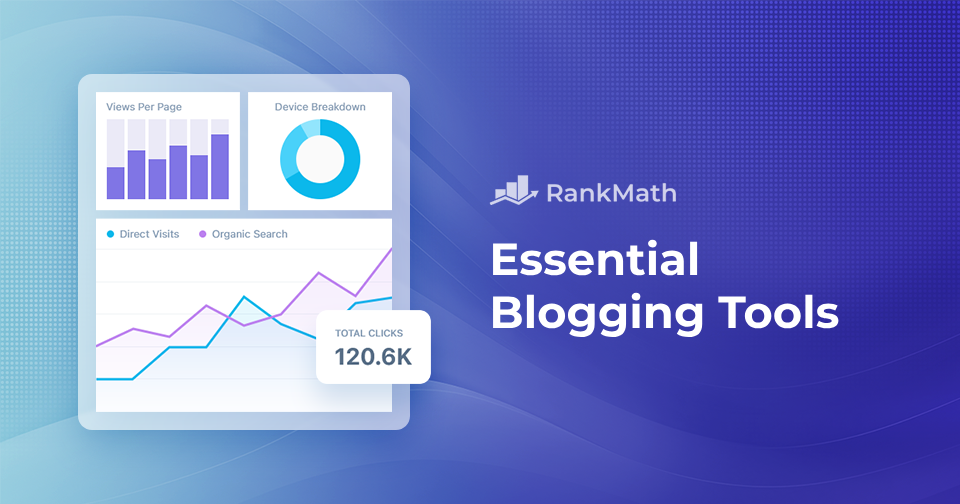Blogging isn’t just a hobby anymore—it’s a full-blown industry, and in 2026, blogging will be more competitive than ever.
If you want your blog to stand out and grow a loyal audience, you need the right blogging tools in your toolkit.
From domain name generators to audience engagement, from SEO optimization to analytics tracking, these blogging tools serve as the backbone of any blog, helping to reach wider audiences and achieve goals.
In this post, we’ll explore the essential blogging tools that can transform your blog from ordinary to extraordinary.
So, are you ready to explore these powerful tools? Let’s dive in!

Table Of Contents
- Why Do You Need Blogging Tools?
- How to Choose the Right Blog Tools
- Domain Name Generator Tools
- Trademark Search Tool
- Domain and Web Hosting
- Content Management System (CMS)
- Keyword Research Tools
- Search Engine Optimization (SEO) Tools
- Web Design Tools
- Graphic Design Tools
- Custom Domain Email
- Analytics and Tracking Tools
- Displaying Ads
- Translation Blogging Tools
- Caching and CDN Tools
- Email Marketing Tools
- Conclusion
1 Why Do You Need Blogging Tools?
To truly thrive in blogging, you need tools that streamline the writing process, optimize content for search engines, and effectively promote your work to your target audience.
The right blogging tools are invaluable assets, helping you to work smarter. They automate repetitive tasks, saving time and energy for creating high-quality, engaging content.
These blogging tools provide valuable insights into your blog’s performance, audience behavior, and content trends, enabling data-driven decisions and strategy refinements for maximum impact.
2 How to Choose the Right Blogging Tools
Choosing the right blogging tools can make your blogging journey much easier and more enjoyable.
Start by thinking about your blogging goals—do you want to write casually, build an audience, or make money from your blog? This helps you figure out what kind of tools you need.
For instance, if you want to grow your audience, you’ll need tools that help with SEO, social sharing, and email marketing.
Next, look for a user-friendly blogging platform like WordPress, which offers a lot of flexibility and plugins.
If you’re not very tech-savvy, choose tools that are simple to use and offer good customer support. Also, consider tools that help you write better, like grammar checkers or AI writing assistants.
Budget is another factor—some tools are free, while others charge a monthly fee. It’s okay to start small and upgrade as your blog grows.
Reading reviews and trying free versions can help you decide what works best for you.
The best blogging tools are the ones that match your needs, are easy to use, and help you stay consistent with your blogging.
Let us now discuss the various blogging tools that’ll help you manage your blog.
3 Domain Name Generator Tools
Your domain name is the online address of your blog, creating an important initial impression. Finding a unique, memorable, and available domain can be challenging.
This is where domain name generator tools prove useful. They streamline the process by suggesting creative options based on your keywords and the desired domain extensions like .com, .org, or .blog.
Let’s look at two popular domain name generators.
3.1 Namelix
Namelix is a free, powerful domain name generator tool that combines artificial intelligence and human creativity to suggest relevant and brandable domain names.
Start by entering keywords related to your business. For example, if you’re starting a BBQ blog, try words like barbecue and flame. Click Generate to continue.

Choose a name style — Auto is a good starting point. Then, select how creative you want the results to be. The High option gives more variety, but if you want a balanced mix, go with Medium. Click Next.
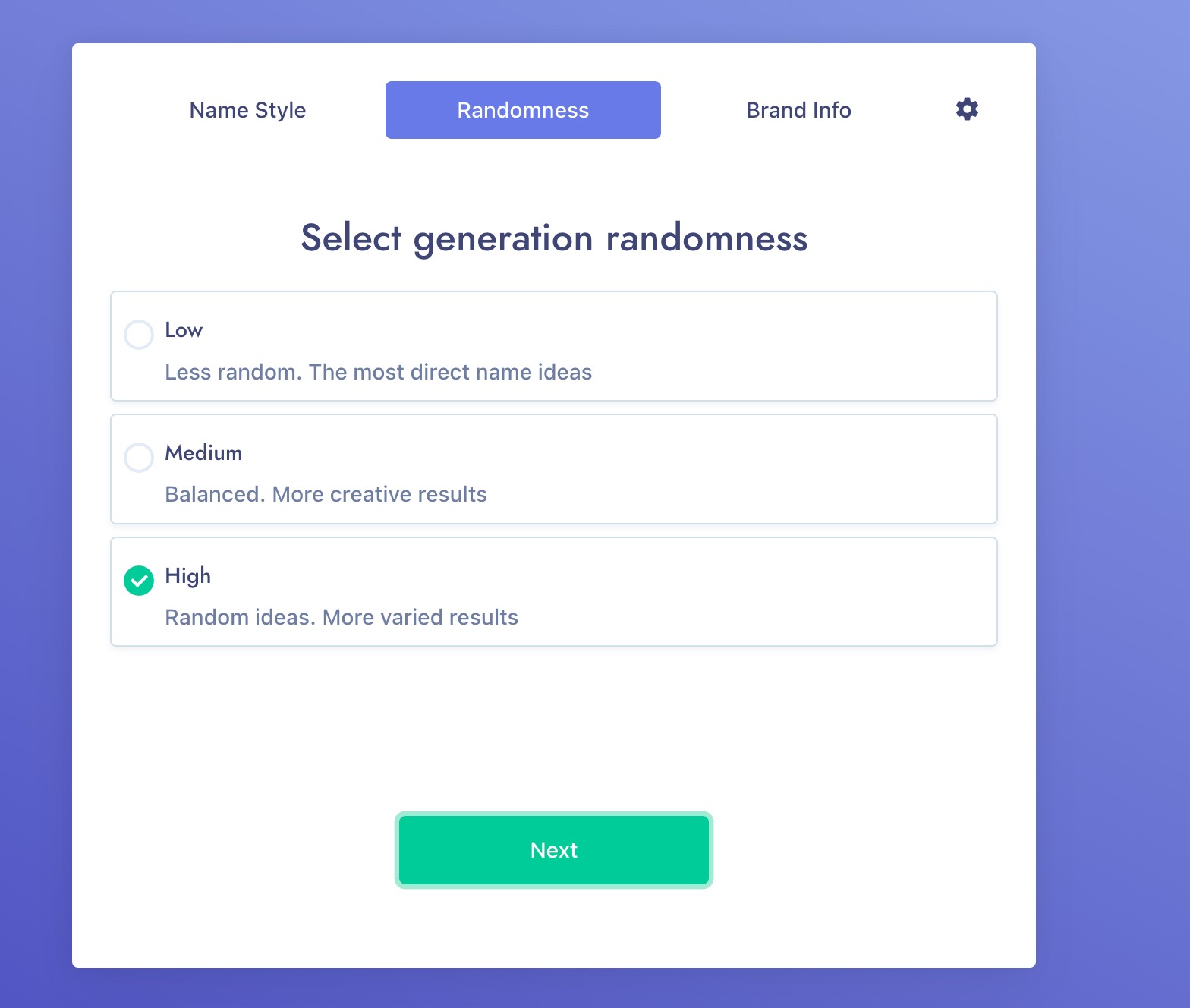
You can add a brief business description here, or leave it blank and click Generate.
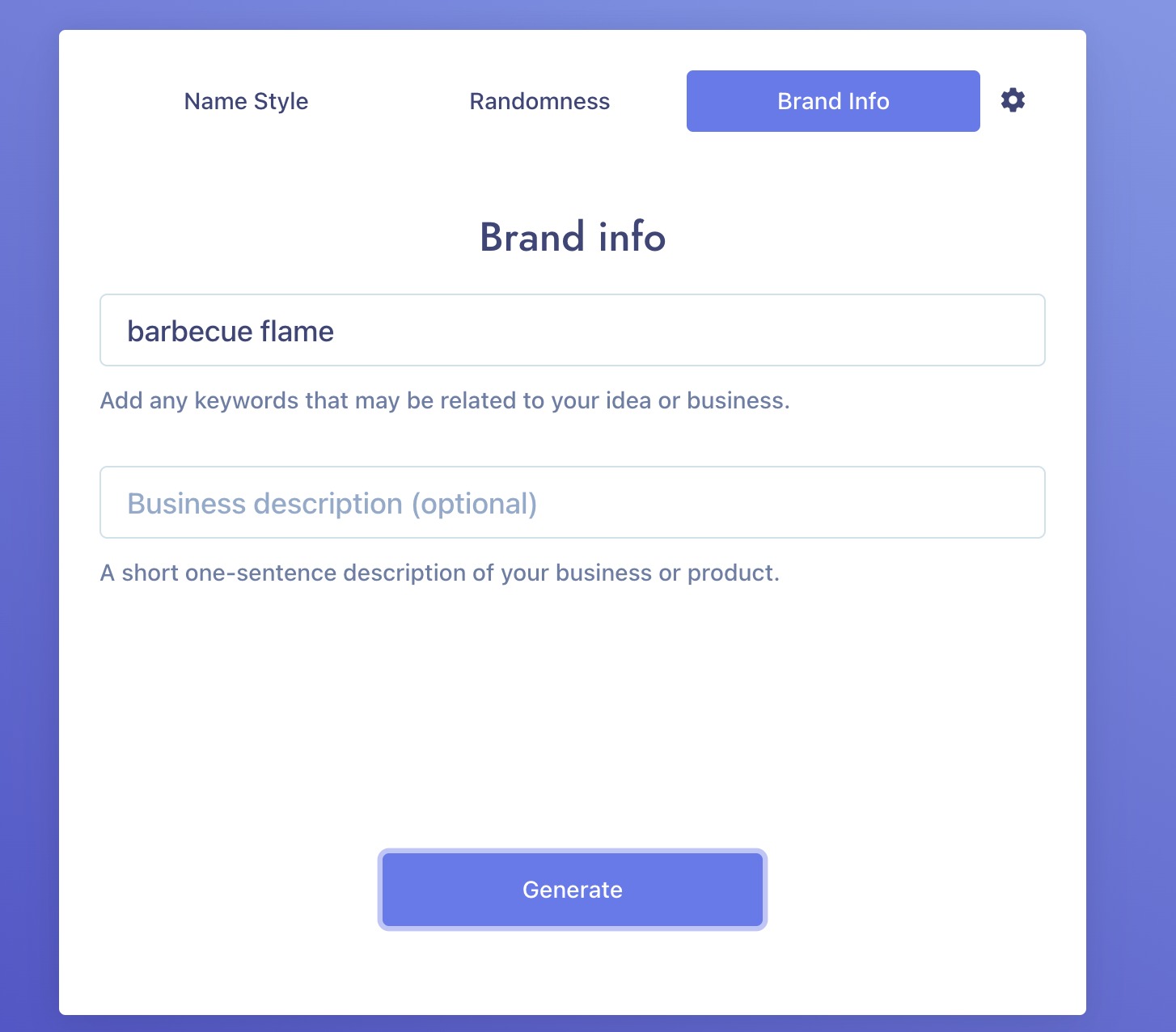
Namelix will now suggest domain names. Green text indicates that the .com version is available. Browse through the list and pick a name you like.

Key Features of Namelix:
- AI-Powered Name Generator – Namelix uses artificial intelligence to generate unique and creative business name ideas based on your input.
- Custom Filters – You can refine your results by choosing the name style, length, and industry to get more relevant suggestions.
- Domain Availability Check – It automatically checks if the domain for a suggested name is available, saving you time.
- Logo Suggestions – Namelix offers matching logo ideas through its integration with Brandmark.io, helping you build a complete brand.
- Learns Your Preferences – The tool improves suggestions over time by learning from the names you like or save.
- Easy to Use Interface – Its simple and clean interface makes it beginner-friendly and quick to navigate.
- Fast and Free – Namelix gives instant name ideas at no cost, making it great for startups and small businesses.
3.2 Looka
Looka goes beyond domain name generation, offering a comprehensive branding suite. While generating domain names, Looka also provides logo design options, helping you develop a cohesive brand identity.
Just like Namelix, start by typing in a keyword.
Then, you can set the desired length of your business name. A good range is 4 to 15 characters, as this usually allows for 2–3 words, keeping your domain descriptive and easy to remember. However, if you’re aiming for shorter, more brandable names, try setting the limit to 7 or 8 characters.

Once you’ve set your preferences, click the Generate button. Looka will instantly show you a list of business name ideas.
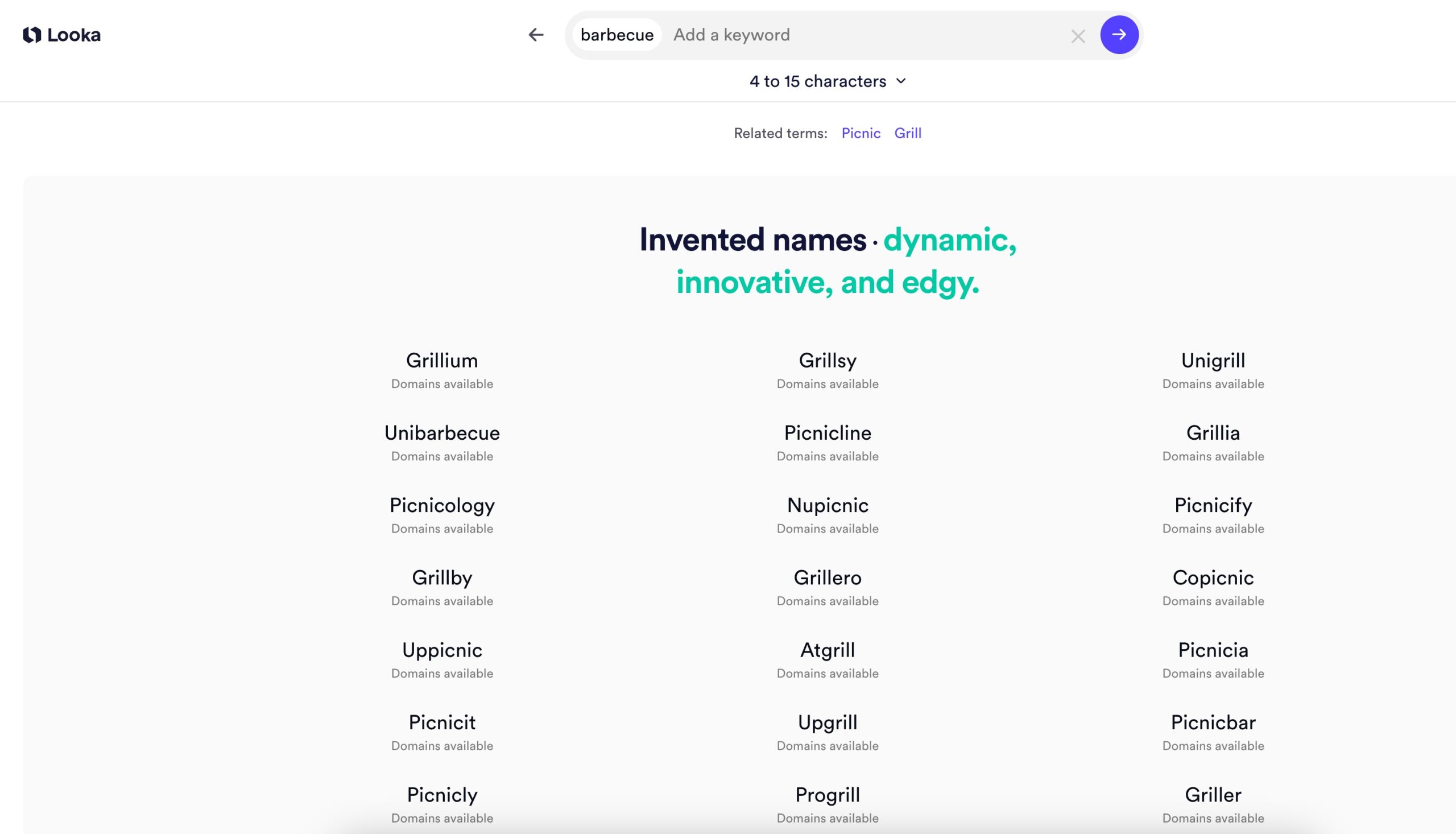
If you want even more suggestions, simply click the refresh or load more button to explore more options.
One of the best features of Looka’s tool is that it checks domain name availability for you. Just click on any name you like, wait a moment, and Looka will show which top-level domains (TLDs) are available—no need to check elsewhere.
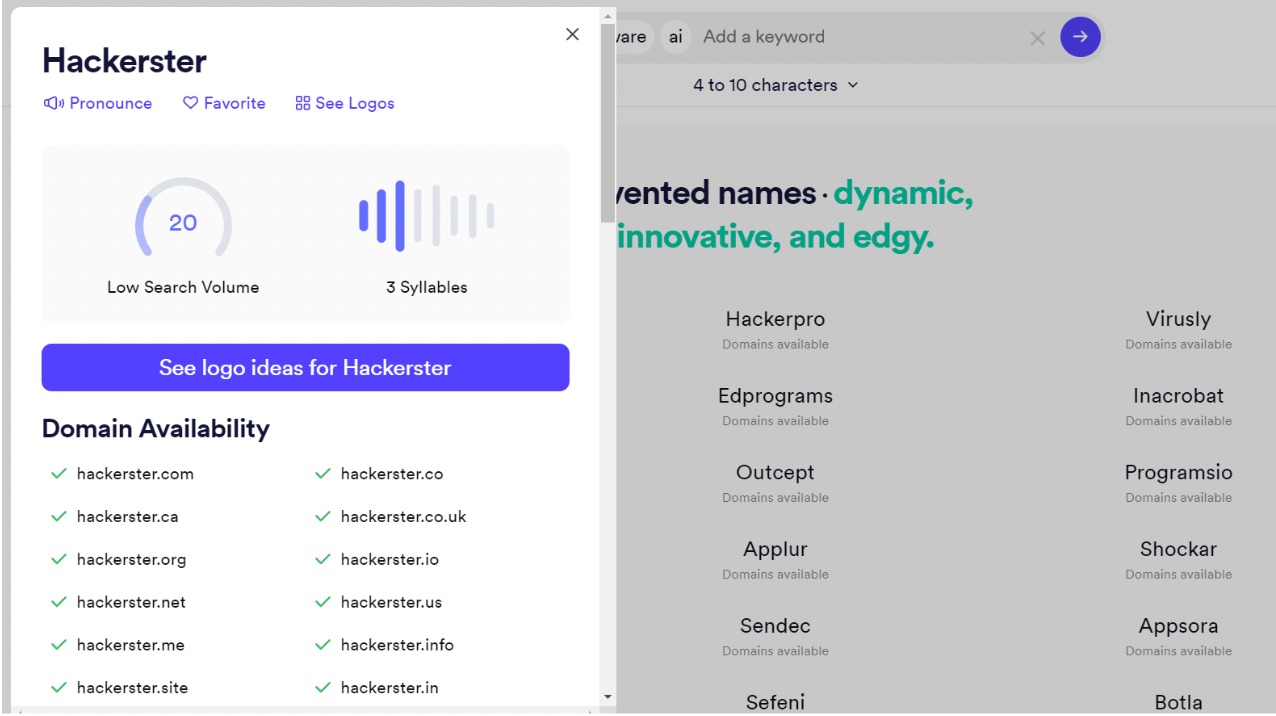
Key Features of Looka:
- Customizable Name Length – You can set how long or short you want your business name to be, depending on whether you want it to be brandable or descriptive.
- Instant Domain Availability Check – Looka checks and shows domain availability right away, so you don’t need to visit another site.
- Logo Maker Integration – You can instantly create a matching logo using Looka’s built-in logo design tool.
- Easy to Use Interface – The platform is beginner-friendly with a clean design, making it simple to explore and choose names.
- Endless Name Ideas – You can keep generating or refreshing to get more name suggestions without limits.
While these tools are great for brainstorming, here are some tips to keep in mind when choosing a domain name for your blog:
- Opt for a domain name under 15 characters in length for memorability.
- Avoid using hyphens, numbers, and underscores (e.g., site123.com, wax_pro.org), as they can make the domain harder to remember.
- Ensure the domain name is easy to spell and pronounce.
- For simplicity, limit the domain to no more than six syllables.
- Avoid domain names that can restrict future expansion. For instance, Looka was formerly Logojoy but changed to a more versatile name to accommodate offering additional services beyond logo design, like business name generators and graphic design.
After selecting the ideal domain name for your brand, you’ll need to register and host it for your website.
4 Trademark Search Tool
Before purchasing a domain name, it is important to ensure it doesn’t infringe on any existing trademarks. This is where the Trademark Electronic Search System (TESS) comes in.
TESS, a free tool by the U.S. Patent and Trademark Office (USPTO), lets you search for trademarks similar or identical to your chosen domain name. Using TESS helps avoid legal headaches and ensures your name is unique.
Enter your desired domain name or keywords related to your blog’s niche, and TESS will search for matching trademarks.
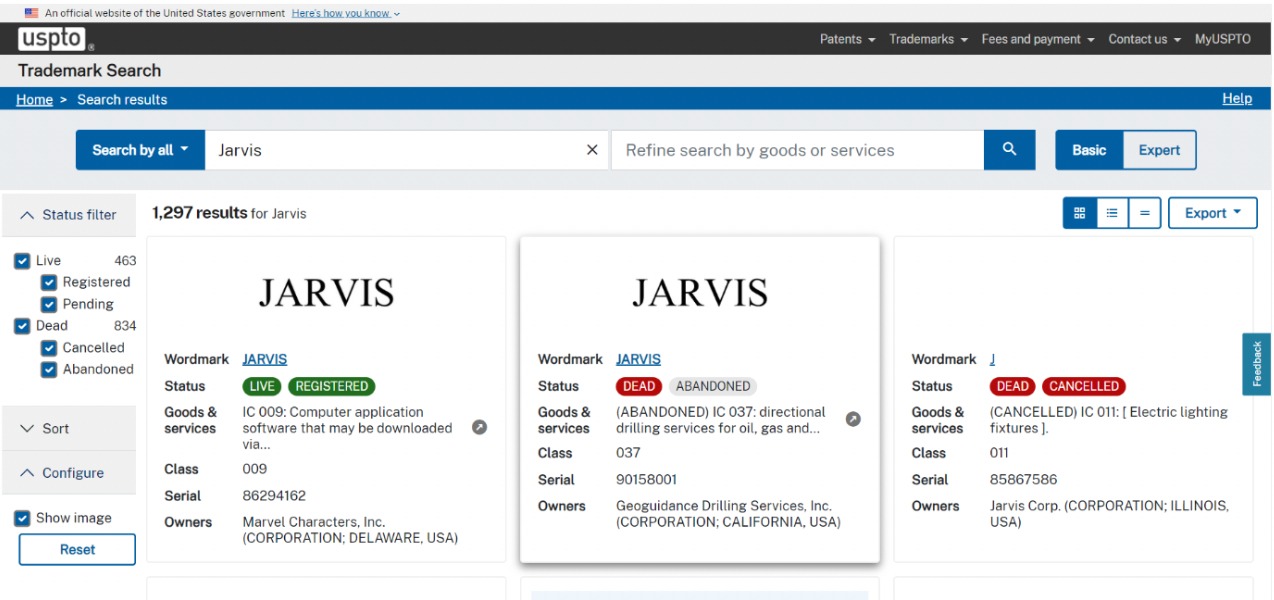
However, note that TESS doesn’t guarantee that your chosen domain name is legally available.
It’s always recommended to consult with a legal professional or trademark attorney to ensure compliance with all applicable laws and regulations.
Key features of the Trademark Search Tool (TESS):
- Free to Use – Provided by the U.S. Patent and Trademark Office (USPTO) at no cost.
- Trademark Availability Check – Helps you find trademarks that are identical or similar to your desired domain or blog name.
- Keyword-Based Search – Allows you to search using domain names or keywords related to your blog’s niche.
- Avoids Legal Issues – Helps prevent trademark infringement and potential legal problems by showing existing trademarks.
5 Domain and Web Hosting
With your domain name vetted and ready to go, it’s time to explore reliable domain registration and web hosting providers.
5.1 Domain Name Registration
Several providers offer domain registration services, including Namecheap, a popular choice for its affordability and user-friendly interface.
When you come up with a few domain name ideas and want to check if they’re available, just type the name into Namecheap’s search bar—whether it’s a .com, .net, or something else.

Namecheap will instantly tell you if it’s available. It’s really that simple.

If you like a name and it’s available, you can go ahead and buy it right on Namecheap. It’s one of the most well-known and trusted domain registrars.
Remember, you can register your domain name with one provider (like Namecheap) and host your website entirely with another company. This flexibility allows you to switch hosting providers easily, minimizing downtime.
Key features of Namecheap:
- Domain Name Search and Registration – Easily check availability and register domain names with a wide range of TLDs.
- Affordable Pricing – Offers competitive prices for domains, hosting, SSL, and more.
- User-Friendly Interface – Clean, simple dashboard for managing domains, DNS, and hosting.
- No Aggressive Upselling – Known for its straightforward, non-salesy approach.
- Email and Hosting Services – Offers web hosting, business email, and WordPress hosting options.
- Domain Transfer Support – Smooth process for transferring domains from other registrars.
- Security Features – Provides SSL certificates, two-factor authentication, and premium DNS options for extra protection.
5.2 Web Hosting
For most beginner blogs, shared hosting from providers like one.com and Dogado offers reliable and affordable solutions.
Keep in mind that these are just a few examples, and there are many other reputable hosting companies to consider based on your specific needs and preferences.
When researching hosting providers, evaluate factors such as:
- Reliability and uptime guarantees
- Speed and performance capabilities
- Built-in security features like firewalls and mod security
- Type of server processor offered
- Availability of high-performance NVMe storage
- User-friendly control panel interfaces
- Quality of customer support
- Backup and restore functionality
- Pricing and overall value proposition
Conducting thorough research will help you find a hosting provider that aligns with your budget, technical requirements, and performance expectations.
6 Content Management System (CMS)
Your Content Management System (CMS) is the software for creating, managing, and publishing your blog content.
Among the various options available, WordPress stands out as the best and most recommended CMS platform for bloggers.
6.1 WordPress
WordPress (specifically WordPress.org, the self-hosted version) is a powerful, open-source CMS that offers a user-friendly interface, making it easy for bloggers of all skill levels to create, publish, and manage content effectively.
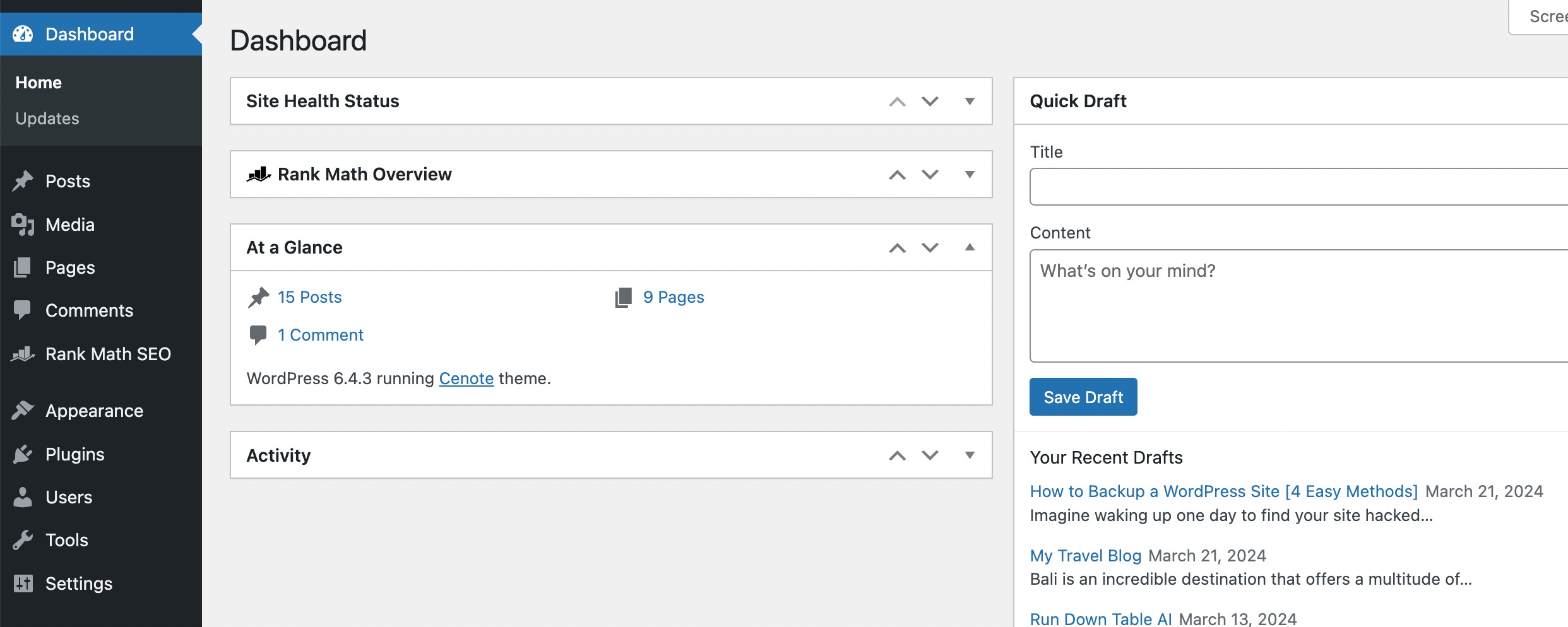
WordPress.org stands out as a top recommendation for bloggers for several compelling reasons:
- User-friendly: Its intuitive interface allows beginners to create and manage content easily.
- Unmatched Flexibility: WordPress.org offers a vast library of free and premium plugins and themes that let you customize your blog’s functionality and design however you like.
- Open-source and Self-hosted: With WordPress.org, you have full control over your blog’s data and features. You’re not limited by a closed platform, which means you can customize freely and truly own your content long-term.
While alternatives like Wix, Joomla, Squarespace, Blogger, Shopify, Drupal, and others exist, WordPress offers a unique combination of ease of use, extensive customization options, and long-term control – making it an ideal platform to power your successful blog.
After choosing WordPress as your CMS platform, selecting the right theme is the next step.
Your theme dictates your blog’s visual identity, impacting user experience and brand perception. Here’s where the focus lies:
- Customization: Choose a theme that lets you personalize your blog’s design to match your brand and vision perfectly.
- Lightweight Design: A lightweight theme ensures your blog loads fast, giving readers a smooth experience and boosting SEO (search engine ranking).
Here are several excellent, customizable, and lightweight WordPress themes to consider:
- GeneratePress: Great for developers or those comfortable with code. It’s renowned for speed and flexibility, allowing extensive customization even in the free version.
- Astra: A popular alternative to GeneratePress, Astra offers free customization with even more features in the pro version.
- Neve: Another lightweight and user-friendly theme, Neve is a great choice for those seeking a balance between ease of use and customization potential.
- Kadence WP: This theme focuses on Gutenberg block editing, allowing for high design flexibility through drag-and-drop.
- Blocksy: Lightweight and user-friendly, Blocksy seamlessly integrates with Gutenberg for extensive design customization.
- Schema: If you’re focused on speed and SEO optimization, the Schema theme by MyThemeShop is a lightweight and optimized option.
Remember, this is just a curated selection. With numerous WordPress themes available, research and explore to find the perfect fit for your blog’s unique needs and technical comfort level.
7 Keyword Research Tools
Keyword research is an essential aspect of successful blogging. It helps you understand what your target audience is searching for and create your content accordingly.
Here are some valuable keyword research tools to consider:
7.1 Google Tools
Google offers a treasure trove of free keyword research opportunities. Let us discuss them in detail.
Google Autosuggest
Google Autosuggest is a feature that provides suggested search queries as you type into the search bar.
For example, start typing your desired topic (e.g., “how to bake a cake”) into the Google search bar.

The autosuggestions that appear reveal popular search terms related to your topic. So you can utilize these keyword ideas in your blog content.
Key Features of Google Autosuggest:
- Real-Time Suggestions – Offers keyword suggestions as you type in the Google search bar.
- Based on Popular Searches – Suggests phrases that the audience commonly searches for.
- Saves Time – Helps users complete searches faster by predicting queries.
- Personalized Results – May show suggestions based on your search history or location.
- Spelling and Query Corrections – Helps correct typos and suggests better word choices.
- Content Idea Generation – A great tool for brainstorming blog topics and FAQs.
People Also Ask
When you search for a specific query on Google, scroll down to the People also ask section.
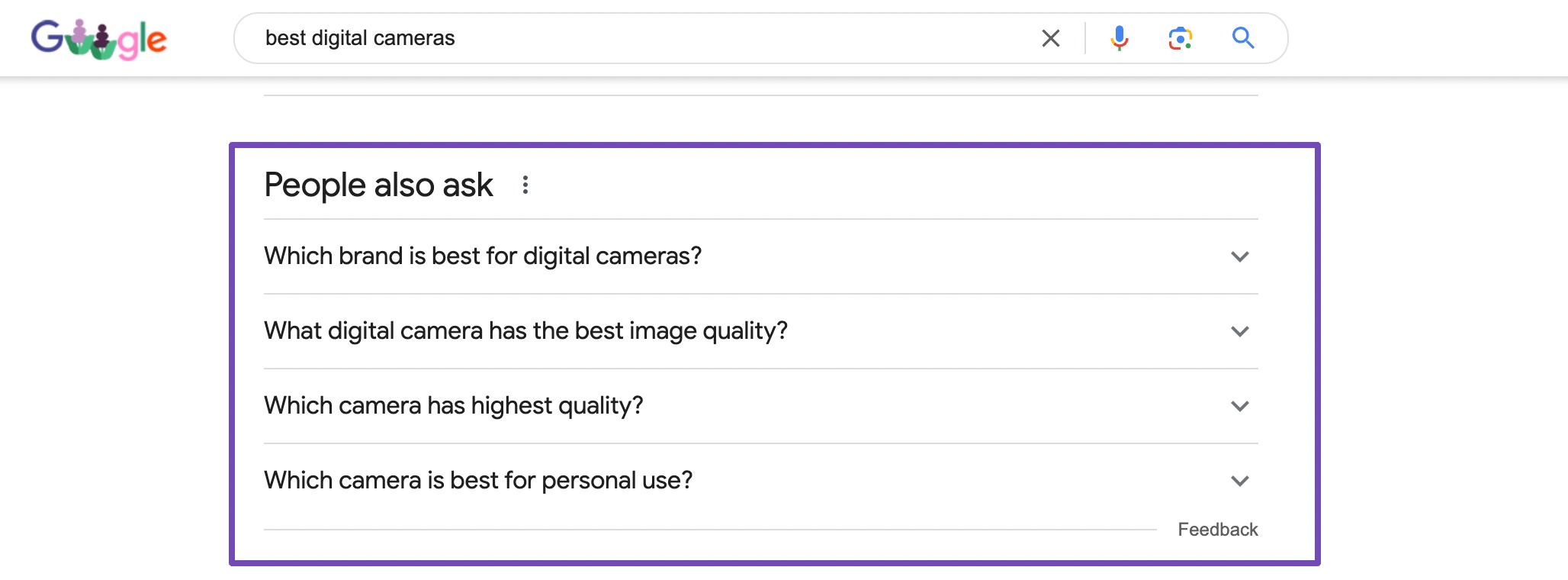
These questions are goldmines for keyword ideas. They reveal what people are curious about within your niche, allowing you to tailor your content to answer those questions and attract more readers.
You can even expand these sections by clicking the dropdown arrows. This reveals even more questions and related searches, offering a rich source of keyword inspiration.
Key Features of People also ask:
- Related Questions Display – Shows a list of questions related to your search query directly in Google’s search results.
- Expandable Answers – Each question can be clicked to reveal a brief answer, often pulled from high-ranking web pages.
- Continuous Suggestions – As you click questions, more related ones appear, expanding the list dynamically.
- Great for Keyword and Topic Research – Helps content creators find common user questions and build relevant content.
Related searches
You’ll find the Related searches section at the bottom of your search results page. This section displays topics related to your initial search query.

The Related searches offer more keyword ideas. They reveal broader search terms people use within your niche, helping you expand your content’s reach and attract a wider audience.
Key features of Related searches:
- Shows at the Bottom of Search Results – Appears at the end of the search results page to suggest additional queries.
- Expands Search Intent – Offers variations of your original query to help refine or broaden your search.
- Keyword Idea Source – Useful for finding new keyword opportunities for SEO and content creation.
- User Behavior-Based Suggestions – Reflects what other users commonly search for related to your topic.
- Clickable Links – Each suggestion is a live link, making it easy to explore more results with one click.
Google Search Operators
Google provides various search operators that can help you refine your keyword research.
For instance, the site: operator allows you to search for keywords specifically within a particular website (e.g., site:rankmath.com speed).

These operators unlock valuable insights into how keywords are used on specific websites and broader searches, giving you a strategic edge in keyword research.
Key Features of Google Search Operators:
- Advanced Search Filtering – Helps narrow down search results with precision using special commands.
- Combine Multiple Operators – Mix different operators for highly targeted search results.
For more details, refer to our Google Search operators guide.
Google Keyword Planner
While primarily intended for paid advertising campaigns, Google Keyword Planner offers some free functionality for bloggers.
You can access the tool within Google Ads to research keywords. Simply select your target country and enter your desired keywords. The tool will display search volume estimates and competition levels for those keywords.

This data can be helpful for identifying relevant keywords to target in your blog content.
Key Features of Google Keyword Planner:
- Keyword Discovery – Find new keywords based on your niche, product, or website.
- Grouped Keyword Ideas – Organizes related keywords into themed groups to help with campaign structure.
- Export and Save Plans – Save keyword lists and download them for future reference or campaign planning.
- Keyword Filtering Options – Filter keywords by location, language, search network, and more.
Google Trends
While not strictly a keyword research tool, Google Trends is invaluable for understanding search term popularity over time.
By entering your target keywords, you can see how frequently those terms are searched for and how those trends fluctuate throughout the year or across different regions.
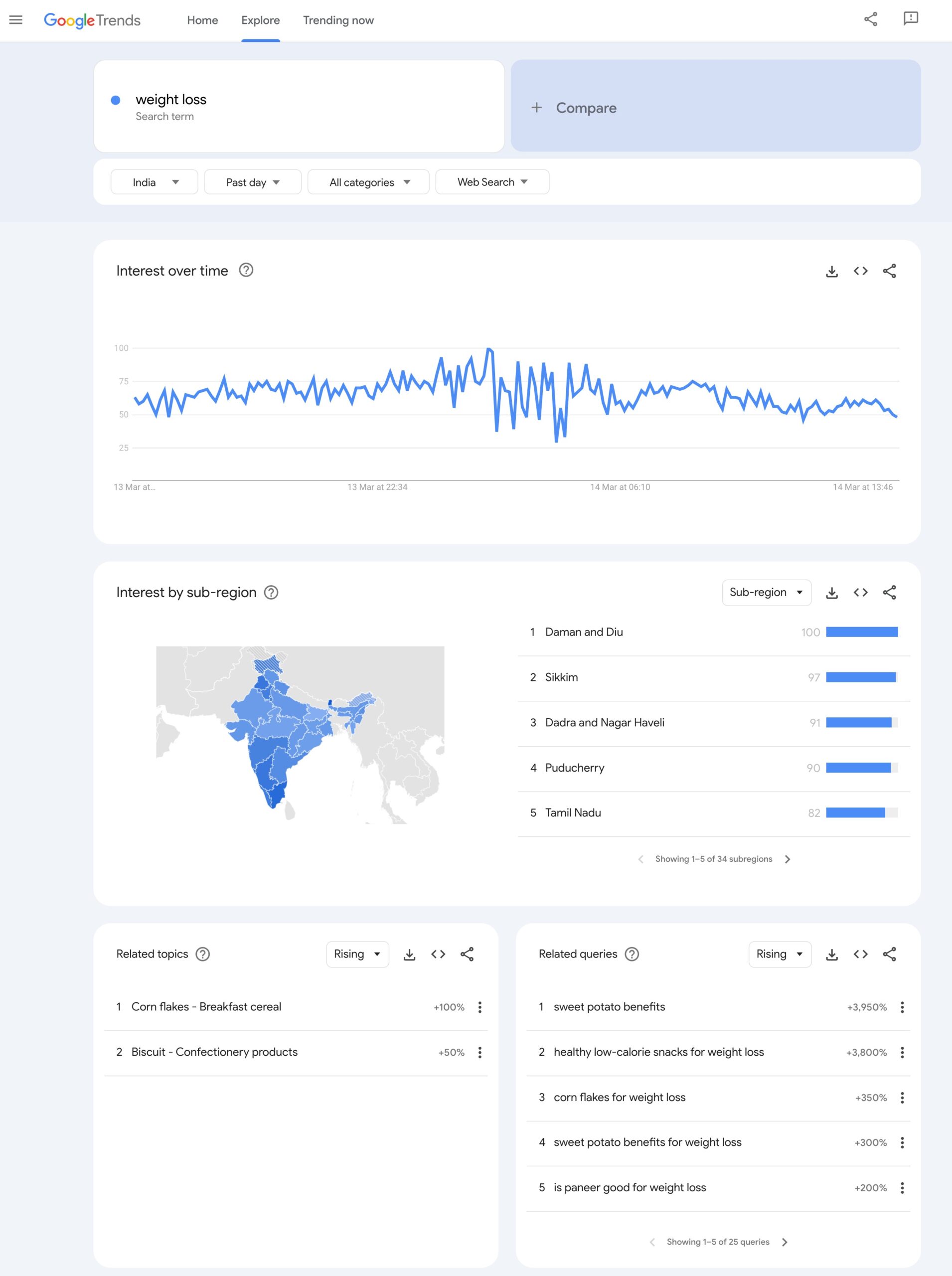
This insight helps you create your content strategy to capitalize on rising search trends and optimize your content for long-term relevance.
Key features of Google Trends:
- Real-Time Search Data – See what topics and keywords are trending right now.
- Interest Over Time – Analyze how search interest for a term has changed over days, months, or years.
- Geographic Insights – Discover where a keyword is most popular by region or country.
- Compare Multiple Terms – Compare search interest between multiple keywords side by side.
- Related Topics and Queries – Get suggestions for trending and rising related keywords.
7.2 Answer the Public
AnswerthePublic is a keyword research tool that visually represents popular search queries related to a specific keyword.
It provides insights into people’s questions, comparisons, prepositions used, and other keyword variations.

This helps you to create your content to user needs, answer their questions, and attract a highly engaged audience.
Key features of Answer the Public:
- Keyword Visualization – Displays search questions and phrases in a visual, mind-map style format.
- Question-Based Insights – Organizes keyword ideas into who, what, where, when, why, and how questions.
- Prepositions and Comparisons – Shows how people search using prepositions (e.g., “for,” “with”) and comparisons (e.g., “vs,” “like”).
- Search Listening Over Time – Tracks keyword trends and changes in search behavior over time (Pro feature).
- Exportable Data – Allows users to download keyword lists in CSV format for easy use in research or content planning.
7.3 Ahrefs Keyword Generator
Ahrefs Keyword Generator is a comprehensive keyword research tool that provides keyword ideas, search volume, keyword difficulty, and other valuable metrics.
It helps uncover relevant keywords and assess their competitiveness. To get keyword suggestions, simply input your desired keyword and choose the country.
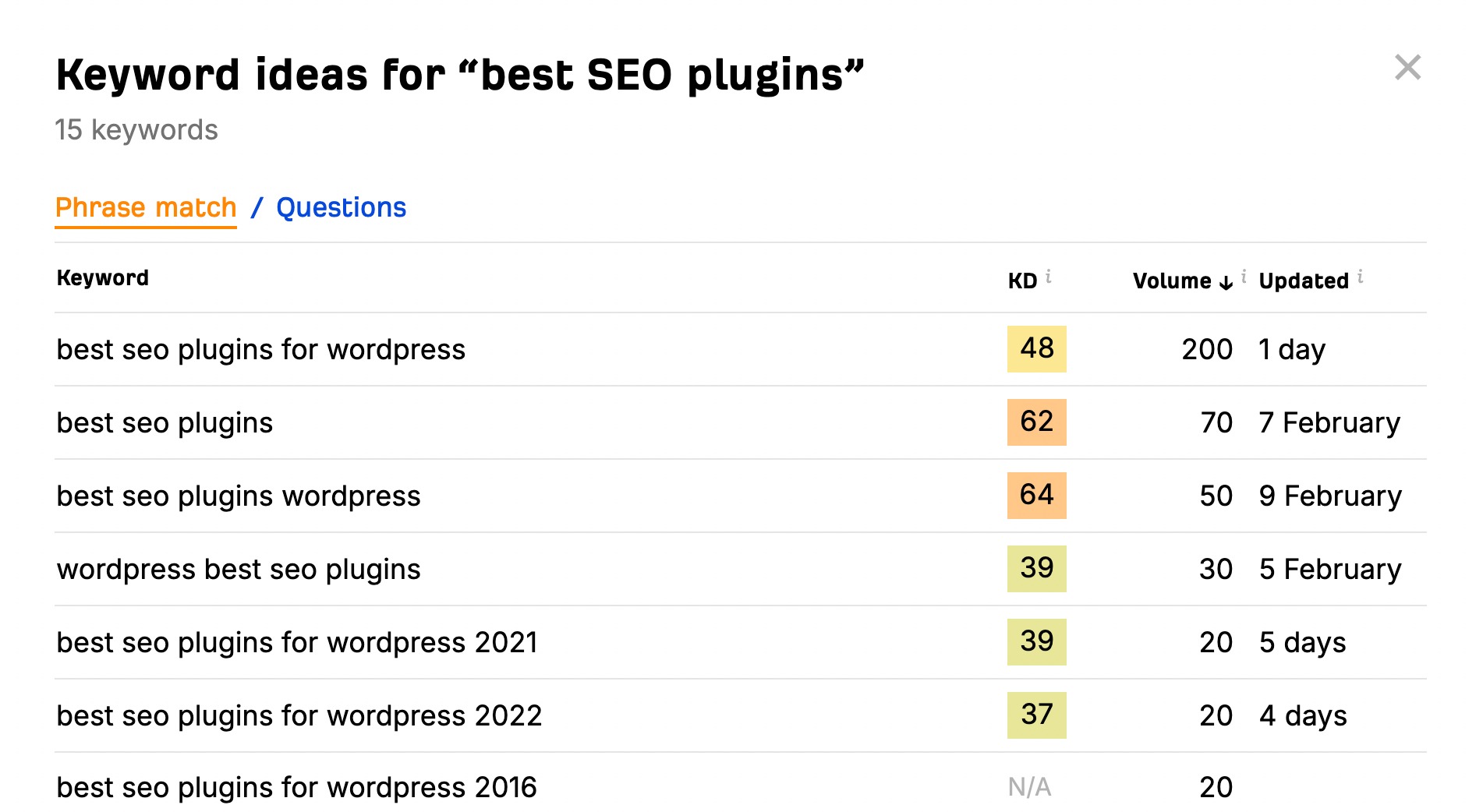
Key features of Ahrefs Keyword Generator:
- Keyword Ideas from Multiple Platforms – Generates keyword suggestions for Google, Bing, YouTube, and Amazon.
- Search Volume Data – Shows estimated monthly search volumes for each keyword.
- Keyword Difficulty Score – Provides a difficulty score to help assess how hard it is to rank for a keyword.
- Questions Filter – Lists question-based keywords to help target long-tail search queries.
7.4 Answers.com
This Q&A platform helps discover real user queries related to your niche.
You just need to browse relevant topics and subcategories to uncover valuable long-tail keyword opportunities.

You can leverage the questions from this platform when crafting a new blog post, incorporating them into your FAQs section, or seamlessly integrating the keywords into your content.
Key features of Answers.com:
- Community-Powered Q&A – Users can ask and answer questions on a wide range of topics.
- Topic-Based Organization – Content is categorized by subjects for easy navigation and discovery.
- Quick, Simple Answers – Provides concise answers to common questions.
- Expert-Verified Responses – Some answers are reviewed or written by knowledgeable contributors.
- Search Functionality – Allows users to search for specific questions or browse existing answers.
7.5 Using ChatGPT
You can leverage ChatGPT’s language understanding capabilities to generate relevant keyword ideas by providing prompts or descriptions related to your blog topic.

Then, you can utilize these keywords when creating fresh content or updating existing content.
Key features of ChatGPT:
- Easy and Fast Access – Available anytime without needing specialized SEO tools or accounts.
- Keyword Idea Generation – Quickly suggests relevant keywords based on your topic or niche.
- Long-Tail Keyword Suggestions – Helps find specific, less competitive keyword phrases.
7.6 Website’s XML Sitemaps
Many websites use XML sitemaps to list their pages. You can sometimes access these by adding /sitemap.xml or /sitemap_index.xml to your competitor’s website URL (e.g., https://example.com/sitemap_index.xml).
These sitemaps won’t reveal the exact content, but they can show the structure and hierarchy of a competitor’s website, as shown below.

This can be valuable for brainstorming content ideas and understanding what topics resonate with your audience.
Please note that not all website sitemaps are publicly visible and accessible from the web. So, this method should not be your primary strategy for obtaining keywords.
Key features of the Website’s XML Sitemaps:
- Organizes Important URLs – Lists all key pages where your target keywords are used, helping track keyword placement.
- Highlights Content Updates – Shows when pages were last updated, useful for identifying pages to refresh with new keywords.
- Supports Search Engine Indexing – Ensures keyword-rich pages get discovered and indexed quickly.
7.7 Rank Math Keyword Research
The Rank Math SEO plugin for WordPress offers a built-in keyword research tool conveniently accessible within the WordPress block editor’s meta box.
When you enter your primary target keyword in the Focus Keyword section of the meta box while writing content, a list of related keyword suggestions automatically populates.

This can be a convenient option for on-the-go keyword research while creating your blog content.
Key features of Rank Math’s Built-in Keyword Research:
- Integrated with WordPress Editor – Easily accessible within the block editor’s meta box.
- Focus Keyword Input – Enter a primary keyword to start keyword research instantly.
- Automatic Suggestions – Generates related keyword ideas in real-time.
- On-the-Go Research – Allows easy keyword exploration while writing content.
8 Search Engine Optimization (SEO) Tools
After creating compelling content, SEO tools empower you to optimize it for search engines, increasing your blog’s visibility and attracting organic traffic. Here are two essential tools:
8.1 Rank Math SEO
Rank Math is a comprehensive and highly recommended SEO plugin for WordPress.
It stands out as the best SEO tool due to its robust features and seamless integration with your blog’s content workflow.
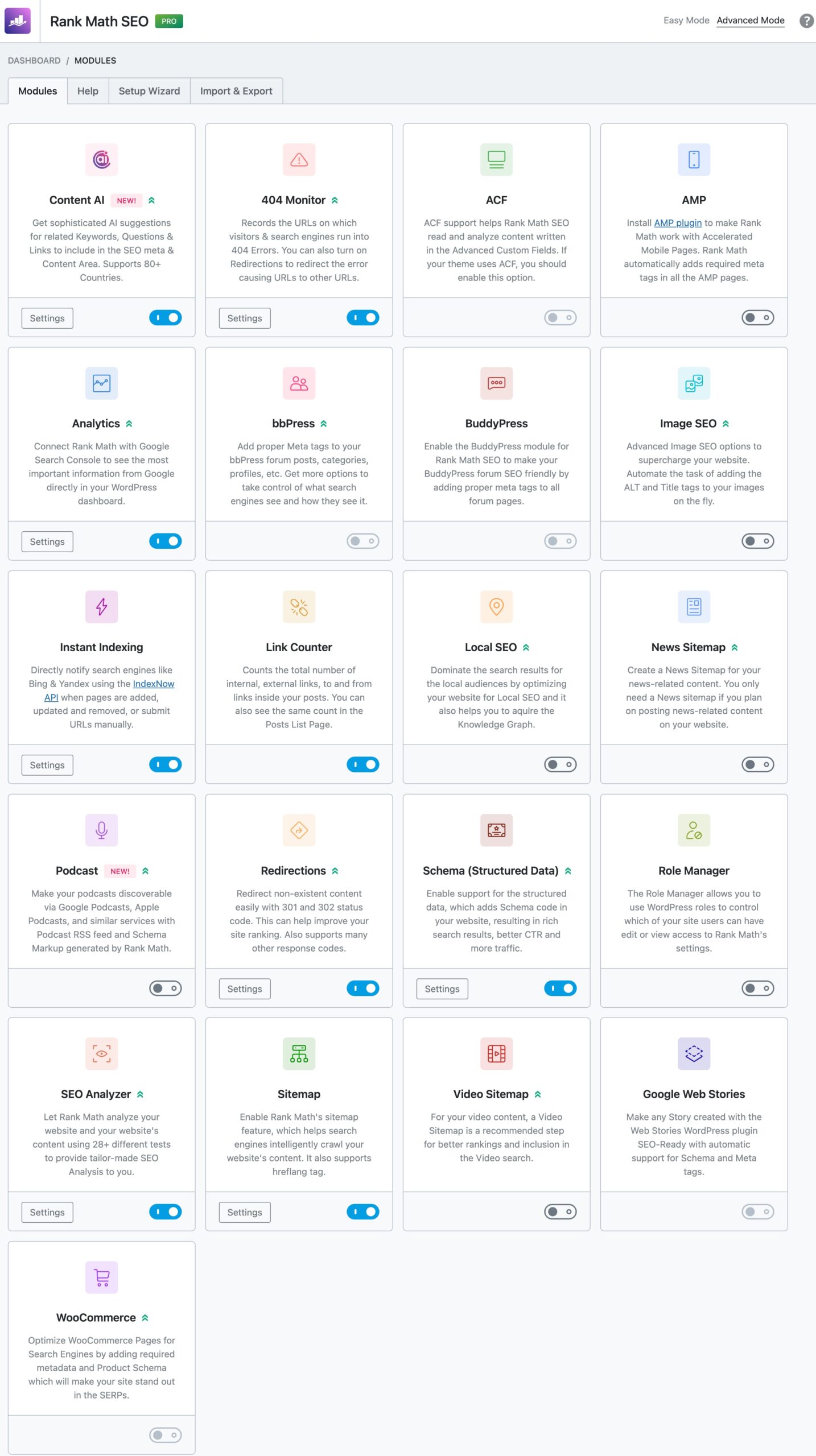
Some of the key features of Rank Math include:
- 404 Monitor to identify and fix broken links for a better user experience
- Redirection Manager for seamlessly redirecting old/broken links
- Content AI tool suggesting improvements for readability and SEO
- Local SEO capabilities with multiple business locations PRO
- Schema Markup support, including multiple schemas per post
- Includes schema blocks like FAQ, HowTo, AI Assistant by Content AI, and Table of Contents block.
- SEO Analyzer provides comprehensive site analysis and recommendations
- XML Sitemaps for better indexing
- Google Search Console and Analytics integration, instant indexing, and more
With its powerful yet user-friendly toolkit, Rank Math streamlines the process of optimizing your content and overall website for better search visibility.
8.2 Grammarly
While not a dedicated SEO tool, Grammarly is essential in improving your blog’s SEO by helping you create authentic, high-quality content.
Search engines prioritize well-written, engaging, and relevant material, making good content essential for SEO success.
You can use Grammarly’s browser extension to catch grammatical, spelling, and style inconsistencies as you write, ensuring your content is polished and error-free.

The free version of this blogging tool offers basic grammar and spell-checking, while the premium version provides advanced features like plagiarism detection, genre-specific writing feedback, and more.
Key features of Grammarly:
- Grammar and Spelling Check – Detects and corrects grammar, punctuation, and spelling errors.
- Style and Clarity Suggestions – Offers improvements for sentence structure, tone, and clarity.
- Plagiarism Detection – Checks text against billions of web pages for duplicate content (Premium feature).
- Multiplatform Support – Works across browsers, Microsoft Word, Google Docs, desktop apps, and mobile devices.
9 Web Design Tools
While your WordPress theme provides a solid foundation, you can extend its design capabilities with Gutenberg block plugins.
These plugins offer pre-designed elements to drag and drop into your posts and pages for a richer visual experience.
9.1 Kadence Blocks
Boasting over 21 unique Gutenberg blocks, Kadence Blocks empowers you to add features like buttons, calls to action, Galleries, progress bars, and more to your blog posts and pages.
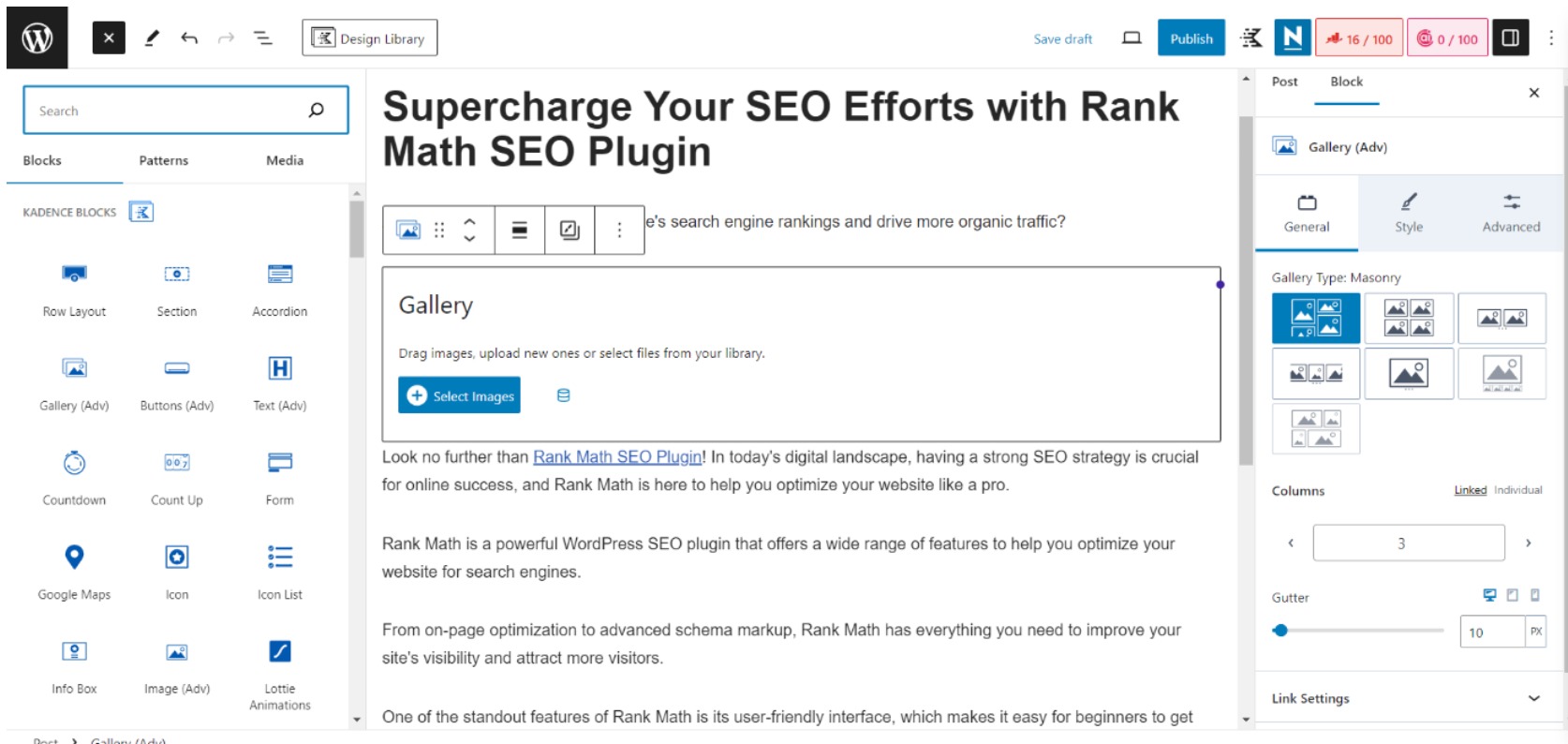
The pro version offers even more powerful blocks and customization options.
Key features of Kadence Blocks:
- Extensive Block Library – Offers over 20 customizable blocks in the free version, including Row Layout, Advanced Heading, Tabs, and more, enabling the creation of complex layouts without coding.
- Pre-Designed Templates – Provides a rich library of professionally designed block templates, allowing users to quickly build pages with a polished look.
- Advanced Customization Options – Gives users full control over typography, colors, spacing, and layout settings, ensuring designs align with brand aesthetics.
- Responsive Design Controls – Includes tools to adjust block settings for different screen sizes, ensuring content looks great on all devices.
- Performance Optimized – Built with lightweight code that only loads necessary assets, contributing to faster page load times and improved SEO.
9.2 Stackable Blocks
With a robust collection of 42 blocks, Stackable Blocks is another excellent choice for adding design flexibility to your blog.
Its blocks cover various design elements, including pricing tables, testimonials, accordions, etc.
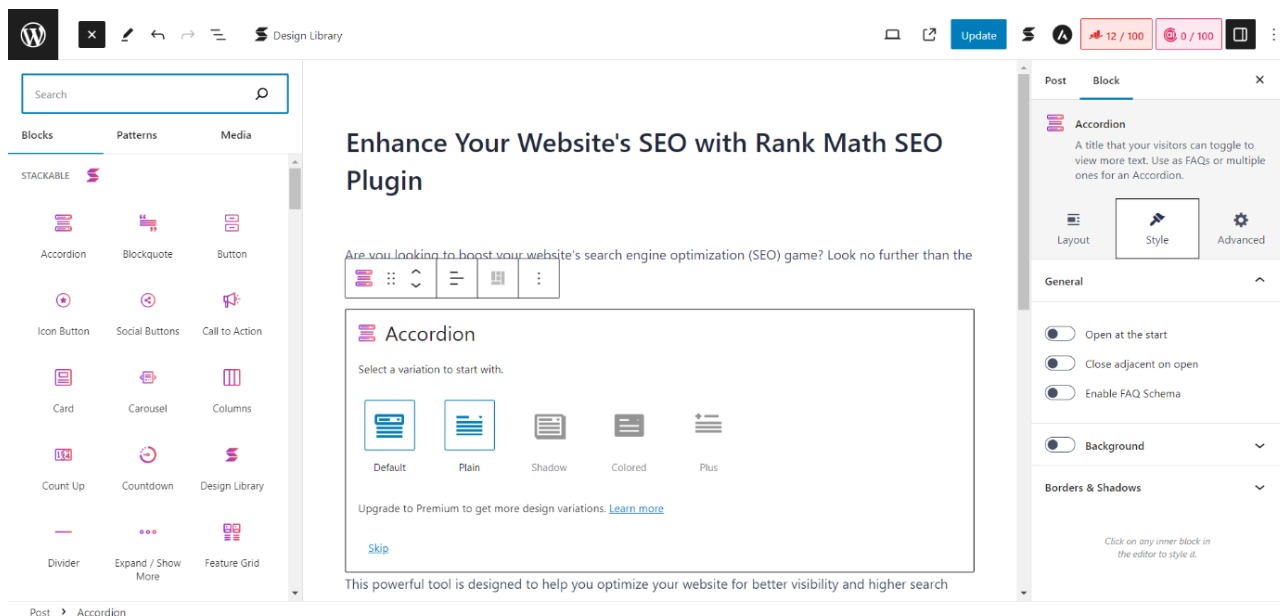
Key features of Stackable Blocks:
- Dynamic Content and Conditional Display – Supports dynamic content integration and conditional display logic, allowing for personalized and interactive user experiences.
- Easy Theme Integration – Works smoothly with the Kadence Theme and other popular WordPress themes, ensuring compatibility and consistent design.
- Regular Updates and Support – Provides ongoing updates with new blocks and features, along with dedicated support for users.
- Advanced Customization Options – Gives users full control over typography, colors, spacing, and layout settings, ensuring designs align with brand aesthetics.
9.3 Postx
If you’re running a magazine-style blog, Postx is a plugin worth considering.
It offers a range of design options tailored specifically for magazine websites, allowing you to showcase your content in an engaging and visually appealing manner.
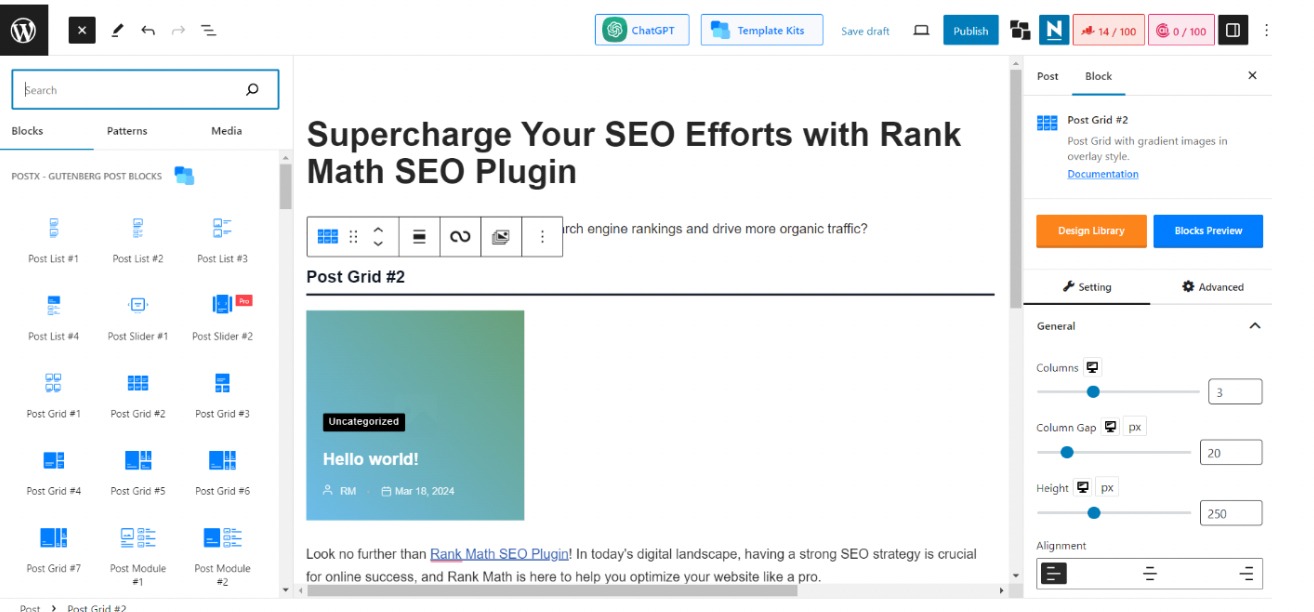
Key Features of PostX:
- Advanced Gutenberg Blocks – Offers a wide range of post grids, lists, sliders, and modules to create dynamic layouts easily within the block editor.
- Pre-made Templates & Starter Packs – Comes with professionally designed templates that can be imported in one click to speed up website design.
- Responsive Design Controls – Lets you customize how your blocks appear on desktop, tablet, and mobile for a fully responsive site.
9.4 Ultimate Blocks
Ultimate Blocks is a great option for those seeking a free Gutenberg blocks plugin.
It delivers 22 unique blocks that allow you to add flair and functionality to your blog. This plugin is a fantastic choice for those prioritizing a free solution with core design functionalities.
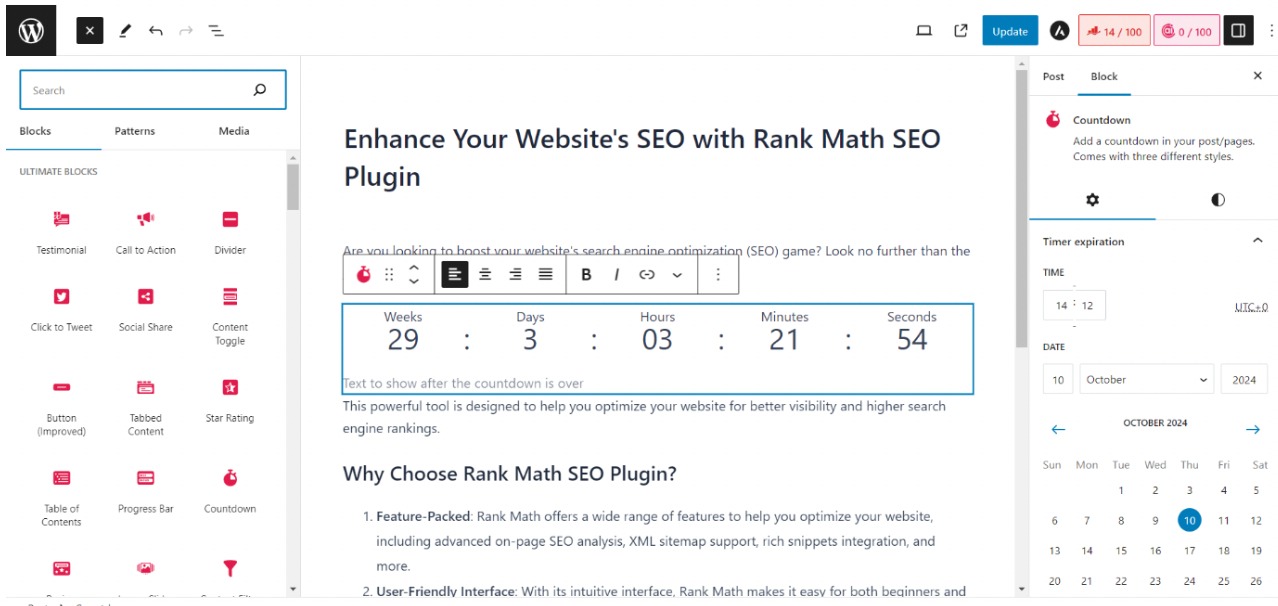
The block plugins come in free and pro versions, with the pro versions offering additional features and advanced functionalities.
They integrate seamlessly with any WordPress theme, allowing you to mix and match design elements flexibly.
Note: It’s recommended to stick to one or two block plugins at most. Using too many can slow down your site and lead to compatibility issues.
Key features of Ultimate Blocks:
- 22 Custom Blocks – Includes Table of Contents, Reviews, Accordions, and more.
- SEO-Friendly – Review blocks support Schema markup for rich snippets.
- Content Toggle – lets you add collapsible FAQs or sections easily.
- Fully Responsive – Blocks adapt to all screen sizes.
- Lightweight & Fast – Optimized for performance and speed.
10 Graphic Design Tools
Compelling visuals are essential for any blog. They grab attention, enhance your content, and make your blog more visually appealing.
Here are some design blogging tools to consider, catering to different budgets and skill levels.
10.1 Adobe Photoshop
Adobe Photoshop is the industry standard for graphic design and photo editing.
While it offers an extensive range of features and tools, it can be expensive for some bloggers, especially those just starting out.
Key features of Adobe Photoshop:
- Advanced Image Editing – Precise tools for retouching, cropping, and manipulating images.
- Layer-Based Workflow – Allows non-destructive editing and complex compositions.
- Selection Tools – Powerful options like Magic Wand and Select Subject for isolating objects.
- Text and Typography Tools – Customizable fonts, styles, and effects for design work.
- Filters and Effects – A wide range of built-in filters for creative enhancements.
- Extensive Plugin Support – Extend functionality with third-party tools and brushes.
10.2 Photopea
Photopea, a well-regarded online graphic design tool, is a great Photoshop alternative.
It’s free and accessible directly via your web browser without downloading or installing.
Photopea supports various file formats, including Photoshop’s .PSD format, facilitating seamless collaboration with files from diverse sources. It boasts features akin to Photoshop, like layers, filters, selection tools, and blending modes.

With Photopea, you can perform advanced image editing tasks and create stunning designs without expensive software.
Key features of Photopea:
- Supports layers and masks for advanced editing.
- Compatible with many file types like PSD, Sketch, and PNG.
- Offers powerful tools like brushes and healing tools.
- Works directly in your browser—no installation needed.
10.3 Canva
Canva is a web-based graphic design tool suitable for professionals and non-designers.
Featuring a user-friendly interface and an extensive library of pre-designed templates, Canva simplifies the creation of visually striking graphics.
It offers a wide range of design elements, such as images, icons, fonts, and customizable templates for social media posts, presentations, and posters.
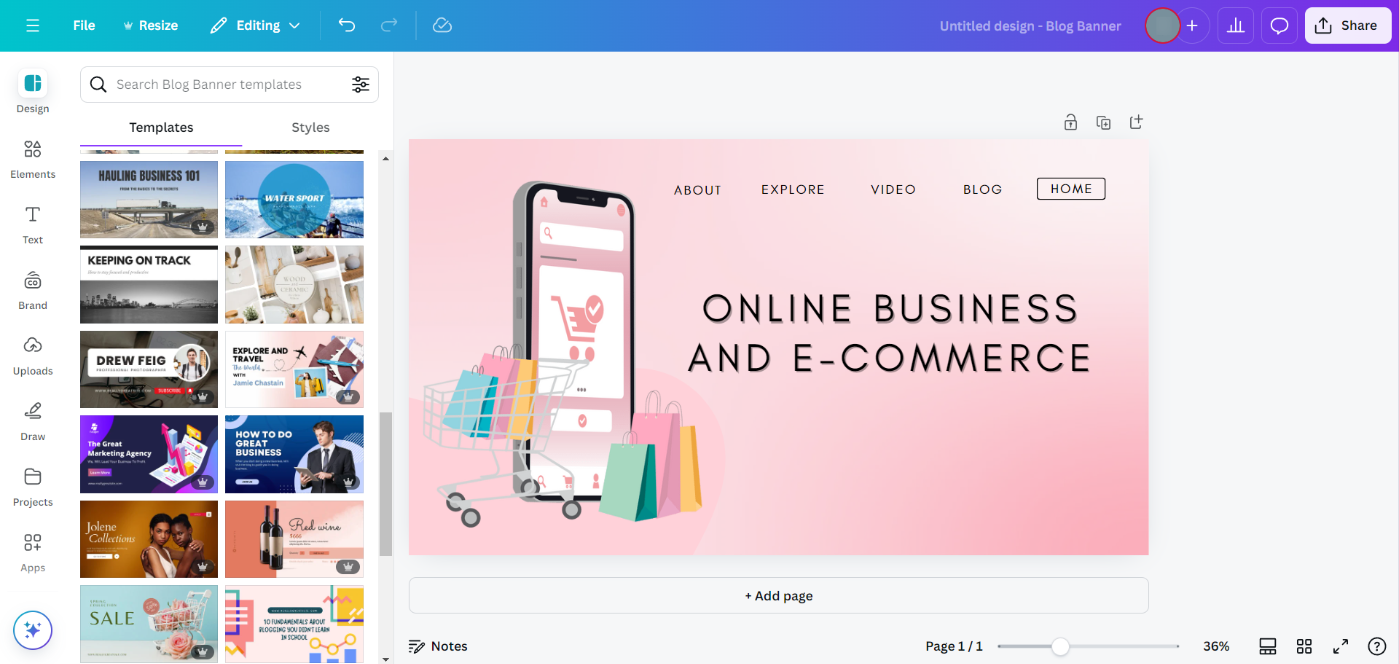
It also offers features for photo editing, brand kit management, and collaboration, making it a versatile tool for various design needs.
By strategically utilizing these tools, you can create high-quality visuals that elevate your blog’s content and engage your readers more deeply.
However, choose the option that best aligns with your budget, technical skills, and desired level of creative control.
Key features of Canva:
- User-Friendly Drag & Drop Editor – Easy to create designs without any graphic design experience.
- Templates Library – Thousands of customizable templates for social media, presentations, posters, and more.
- Extensive Media Resources – Access to millions of photos, icons, fonts, and videos.
- Collaboration Tools – Real-time team collaboration with sharing and commenting features.
- Multiple Export Options – Download designs in various formats like PNG, JPG, PDF, and even animated GIFs or videos.
11 Custom Domain Email
A professional email address using your domain name instantly boosts your credibility and adds a polished touch online.
While many hosting providers offer custom email, Zoho Mail provides an excellent free alternative worth exploring.
Zoho Mail lets you create custom email addresses using your domain name, ditching generic accounts like Gmail or Yahoo.
Their free plan is perfect for bloggers and small businesses, allowing up to 5 users with 5GB of storage each. You can also send attachments up to 25 MB. It works with a single domain, which is ideal for starting.
Setting up Zoho Mail is a breeze, and its interface is familiar, similar to popular email clients you already know. For ultimate convenience, you can access your emails from anywhere using the web interface, desktop apps, or mobile apps.
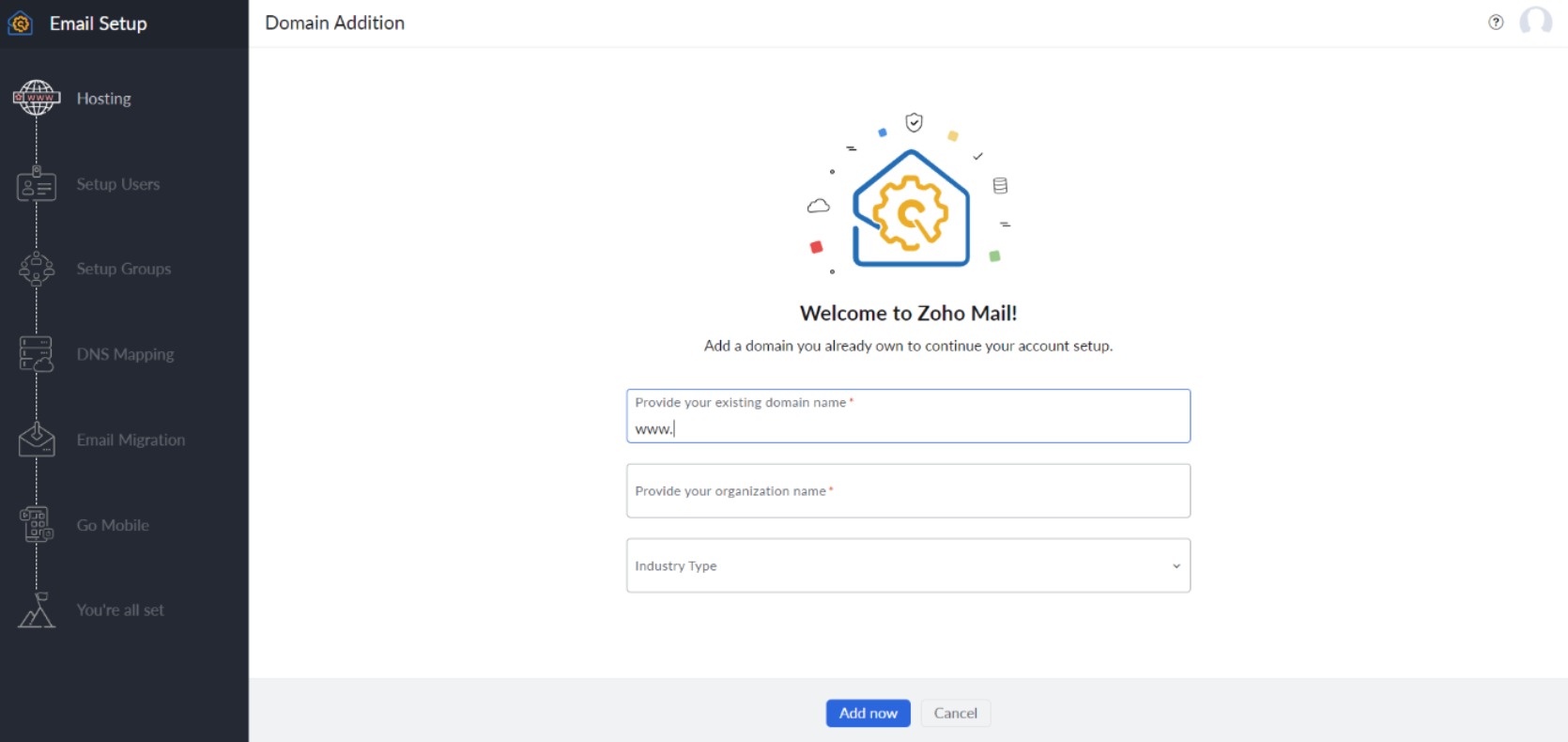
As your needs expand, Zoho Mail offers paid plans starting at just $1 per user per month. These plans unlock more storage, advanced features, and the ability to manage multiple domains.
Key features of Zoho Mail:
- Integrated Calendar and Tasks – Manage emails, calendars, tasks, and notes in one place.
- Advanced Security – Includes encryption, two-factor authentication, and spam filters.
- Custom Domain Hosting – Use your own domain for personalized email addresses.
- Collaboration Tools – Shared folders, streams, and team chat for better teamwork.
Pro Tip: Before exploring external options, check if your current web hosting provider offers custom domain email hosting within its plans. This can sometimes be a more streamlined and cost-effective solution.
12 Analytics and Tracking Tools
Tracking and analyzing your blog’s performance is important for making data-driven decisions and optimizing your content strategy.
12.1 Google Analytics
Google Analytics is a free and comprehensive web analytics service that provides invaluable insights into your blog’s traffic, audience behavior, and content performance.
To get started, simply create a Google Analytics account and set up a property for your website.
Once done, Google Analytics will begin tracking your visitors and their interactions on your site. This lets you see which pages or articles are the most popular, how long visitors stay on each page, and much more.
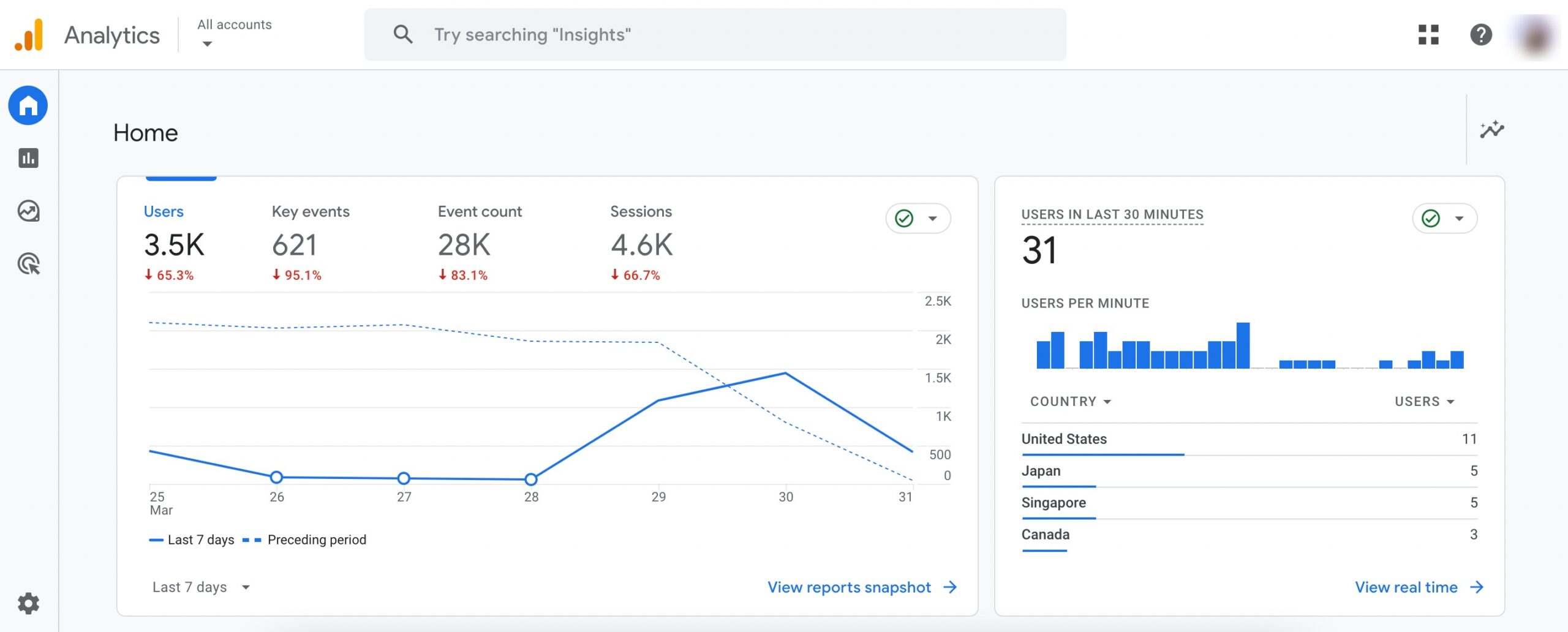
Additionally, you can gain insights into your audience’s demographics, interests, and acquisition channels, enabling you to create your content and marketing efforts accordingly.
Key features of Google Analytics:
- Real-Time Data Tracking – See live visitor activity on your website.
- Audience Insights – Understand visitor demographics, interests, and behaviour.
- Traffic Source Analysis – Discover where your visitors come from (search engines, social media, referrals).
- Behavior Reports – Track how users interact with your site, including page views and session duration.
- Conversion Tracking – Measure goal completions like purchases, sign-ups, or downloads.
- Custom Reports and Dashboards – Create custom reports to focus on the metrics that matter most.
12.2 Rank Math Analytics Module
While Google Analytics offers in-depth insights, the Rank Math SEO plugin provides a built-in Analytics module for convenience within your WordPress dashboard.
It unifies information from various sources, including Google Search Console and Google Analytics, saving you time and effort.
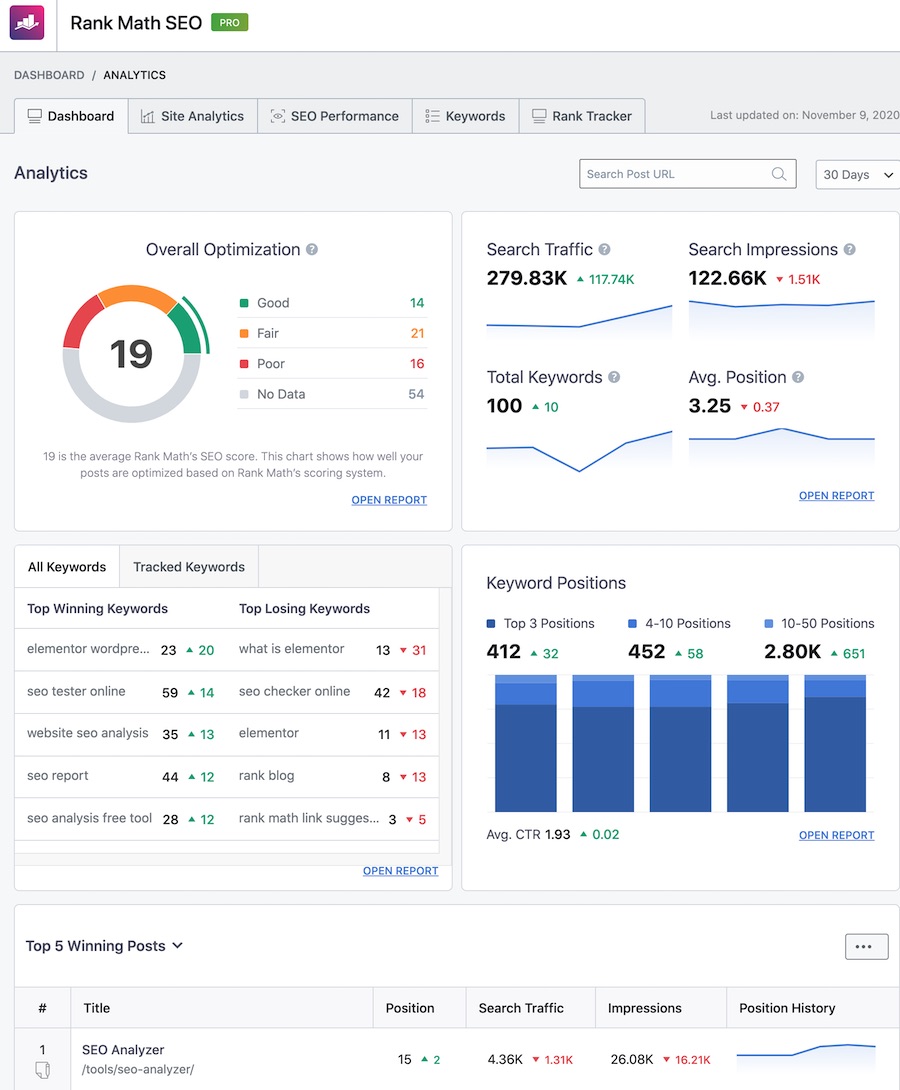
Let’s explore the key sections within this module:
- Dashboard: Get a quick snapshot of your website’s health with metrics like sessions, pageviews, and bounce rate.
- Site Analytics: Dive deeper with detailed data on total visits, top landing pages, traffic sources, user demographics, and more.
- SEO Performance: See the impact of your SEO efforts. Analyze organic traffic, top keywords, ranking positions, click-through rates, and more.
- Keywords: Uncover the keywords driving traffic to your site. Explore each keyword’s search volume, ranking positions, and organic traffic contribution.
- Rank Tracker: Track the performance of your target keywords over time. Monitor their current and past rankings and identify any improvements or declines.
Refer to our dedicated tutorial on our Analytics module to make the most of this module.
13 Displaying Ads
Monetizing your blog through advertising is a common strategy for generating revenue, but it’s essential to approach it strategically and follow guidelines to ensure a positive user experience.
One of the most popular advertising blogging tools for bloggers is Google AdSense.
If your blog is new, it’s recommended that you hold off on applying for Google AdSense right away. Instead, focus on creating a strong foundation of 15 to 20 high-quality, SEO-optimized content pieces that align with Google’s guidelines.
You can refer to our dedicated tutorial on how to get approved quickly for Google AdSense.
Once you have established a substantial content library and your blog has gained traction, you can apply for Google AdSense.
Upon approval, Google will automatically display ads on your blog based on its algorithms and content.
Key features of Google AdSense:
- Automatic Ad Optimization – Google places the most relevant and high-paying ads for you.
- Multiple Ad Formats – Supports display ads, text ads, in-feed ads, in-article ads, and more.
- Performance Tracking – Detailed reports on clicks, impressions, and earnings.
- Reliable Payments – Monthly payouts with multiple payment options once you reach the threshold.
However, you can utilize a plugin like Quick AdSense if you prefer more control over ad placement.
It is a user-friendly plugin designed for WordPress blogs. It lets you manually insert and manage Google AdSense ads on your website.
Simply install and activate the plugin, and then select the desired locations for ad placement, such as before or after your content, in sidebars, or within specific posts or pages.

Sometimes, depending on the theme you’re using, this solution may be built-in without needing a plugin.
14 Translation Blogging Tools
As your blog grows and attracts international attention, you might consider translating your content into multiple languages to reach a wider audience.
Here, we’ll explore two popular translation plugins you can install and activate on your WordPress website.
14.1 Weglot
Weglot is a user-friendly translation plugin that simplifies translating your blog’s content into multiple languages.
It offers an intuitive visual interface that allows you to translate your pages, posts, and other content elements directly within your WordPress dashboard.
Weglot supports machine and human translation, allowing you to choose the best approach for your needs and budget.
You can use Rank Math SEO and Weglot together to improve your website’s ranking and translate it seamlessly.
Key features of using Rank Math with Weglot for multilingual SEO:
- SEO Metadata Translation – Automatically translates meta titles and descriptions.
- Image Alt Text Translation – Improves multilingual image SEO.
- Unique URLs per Language – Enhances indexing with dedicated URLs and hreflang tags.
14.2 TranslatePress
TranslatePress is another powerful translation plugin that provides a seamless multilingual experience for your blog.
It allows you to translate your entire WordPress site, including posts, pages, menus, widgets, and theme and plugin strings.
TranslatePress uses a visual translation editor, making navigating and translating your content easy without switching between different interfaces.
TranslatePress integrates with Rank Math to create a multilingual XML sitemap, helping Google find your content in each language.
Key Features of using TranslatePress with Rank Math:
- SEO Metadata Translation – Translate meta titles and descriptions for all languages.
- URL Slug Translation – Create SEO-friendly translated URLs.
- Social Metadata Translation – Translate Open Graph and Twitter Card tags.
15 Caching and CDN Tools
Caching and CDNs are necessary for improving your blog’s performance, speed, and user experience.
15.1 WP Rocket Plugin
WP Rocket is a premium caching plugin compatible with LiteSpeed and Apache servers. It’s developed to enhance your website’s loading speed, creating a smooth browsing experience for visitors.
With features like page caching, GZIP compression, lazy loading, and file minification, WP Rocket optimizes content delivery for peak performance.
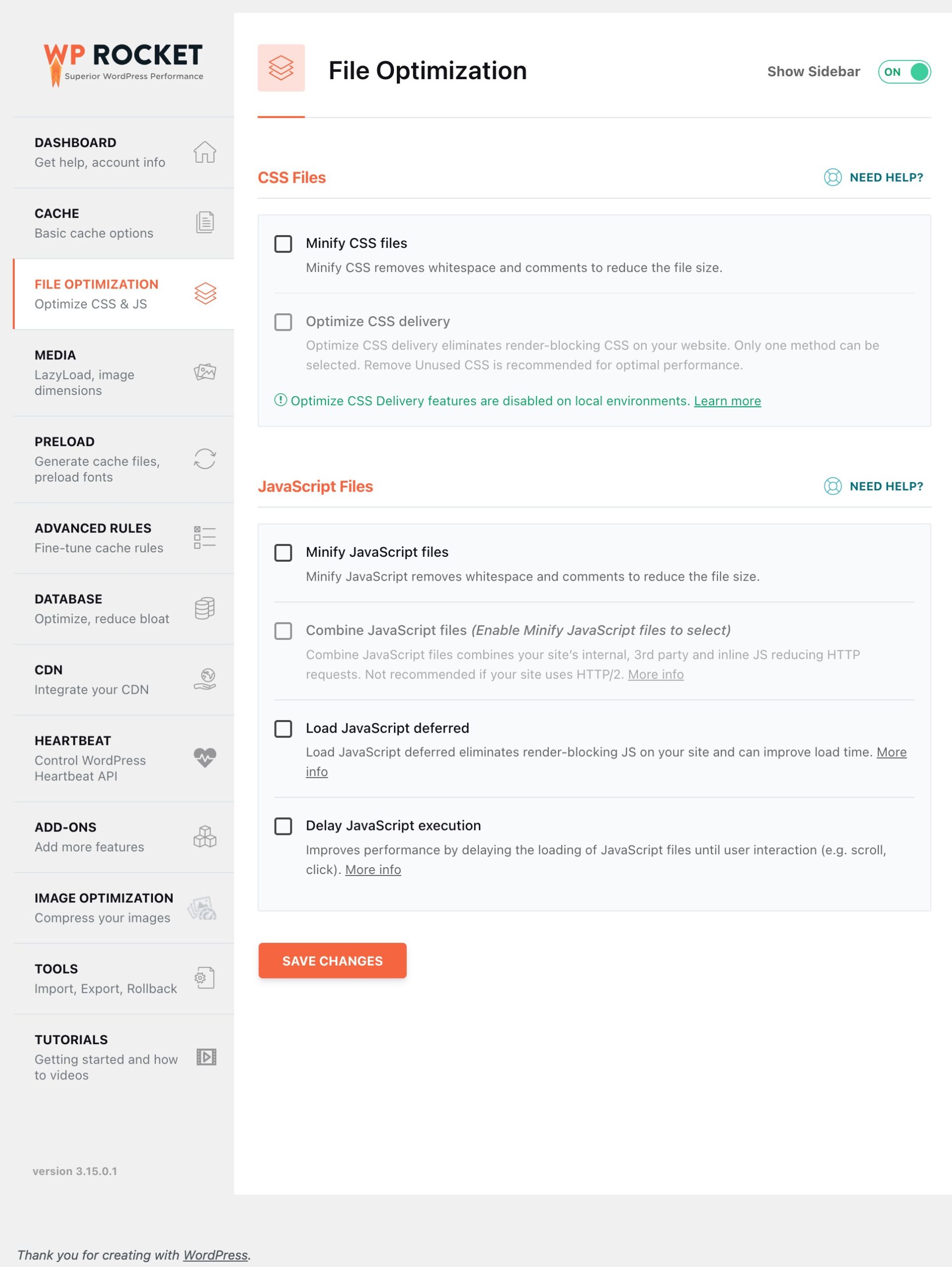
Although a paid plugin, WP Rocket’s intuitive interface and exceptional support make it a worthwhile investment for bloggers seeking top-notch speed optimization.
Key features of WP Rocket:
- Page Caching – Speeds up load times by storing static versions of your pages.
- File Optimization – Minifies and combines CSS and JavaScript files.
- Lazy Loading – Loads images and videos only when they appear in the viewport.
- Database Cleanup – Removes unnecessary data to improve performance.
- CDN Integration – Easily connects with content delivery networks for faster global access.
15.2 LiteSpeed
The LiteSpeed plugin is an essential blogging tool for bloggers using LiteSpeed servers. It’s free to use and comes with presets to help you get your website up and running faster, even if you don’t have technical knowledge about setting it up.

This plugin optimizes your website’s performance by caching your content, reducing server load, and delivering your pages swiftly to visitors.
With its user-friendly interface, you can easily configure caching rules, purge the cache when needed, and leverage advanced features like browser caching and GZIP compression.
Key features of LiteSpeed:
- Built-in Page Caching – Delivers faster load times with powerful server-level caching.
- Optimized for WordPress – Works seamlessly with popular plugins like LiteSpeed Cache.
- Efficient Resource Usage – Handles high traffic with lower memory and CPU usage.
15.3 Cloudflare
Cloudflare is a web security tool offering a robust content delivery network (CDN). By distributing your website’s content across its global network of data centers, Cloudflare ensures that your readers can access your blog quickly, regardless of location.
This CDN accelerates your website’s loading times and protects it from various cyber threats, such as DDoS attacks, malware, and spam.
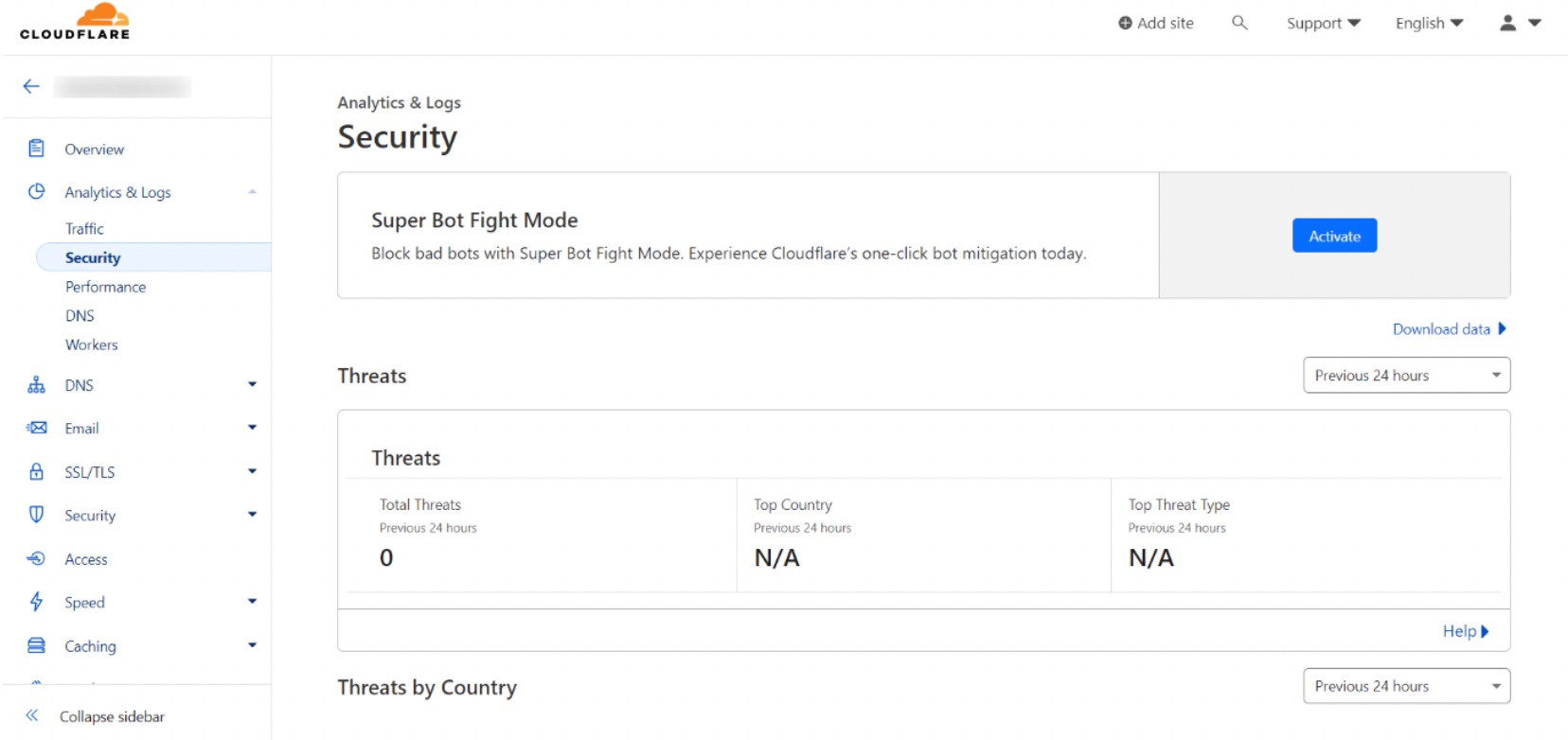
Cloudflare’s advanced features, like automatic caching, SSL encryption, and intelligent routing, further enhance your blog’s security and performance. You can easily connect it to any of the previously discussed cache plugins for easy purging.
Key features of Cloudflare:
- CDN (Content Delivery Network) – Delivers content faster using a global network.
- DDoS Protection – Automatically blocks malicious traffic and attacks.
- DNS Management – Offers fast and reliable DNS resolution.
- SSL/TLS Encryption – Secures your website with HTTPS and SSL.
- Website Firewall (WAF) – Protects your site from common web threats.
16 Email Marketing Tools
Email marketing is a powerful tool for building loyalty, trust, and rapport with your blog’s audience, especially when establishing a solid content foundation.
However, we recommend having at least 30 high-quality content pieces before embarking on an email marketing campaign, as this will provide valuable resources to share with your email subscribers.
When you’re ready to use email marketing for your blog, here are three excellent tools to consider:
16.1 MailerLite
MailerLite is a user-friendly email marketing platform with a drag-and-drop email builder. It makes creating visually appealing newsletters and campaigns easy.
It also provides features like automation, landing pages, and subscriber segmentation.
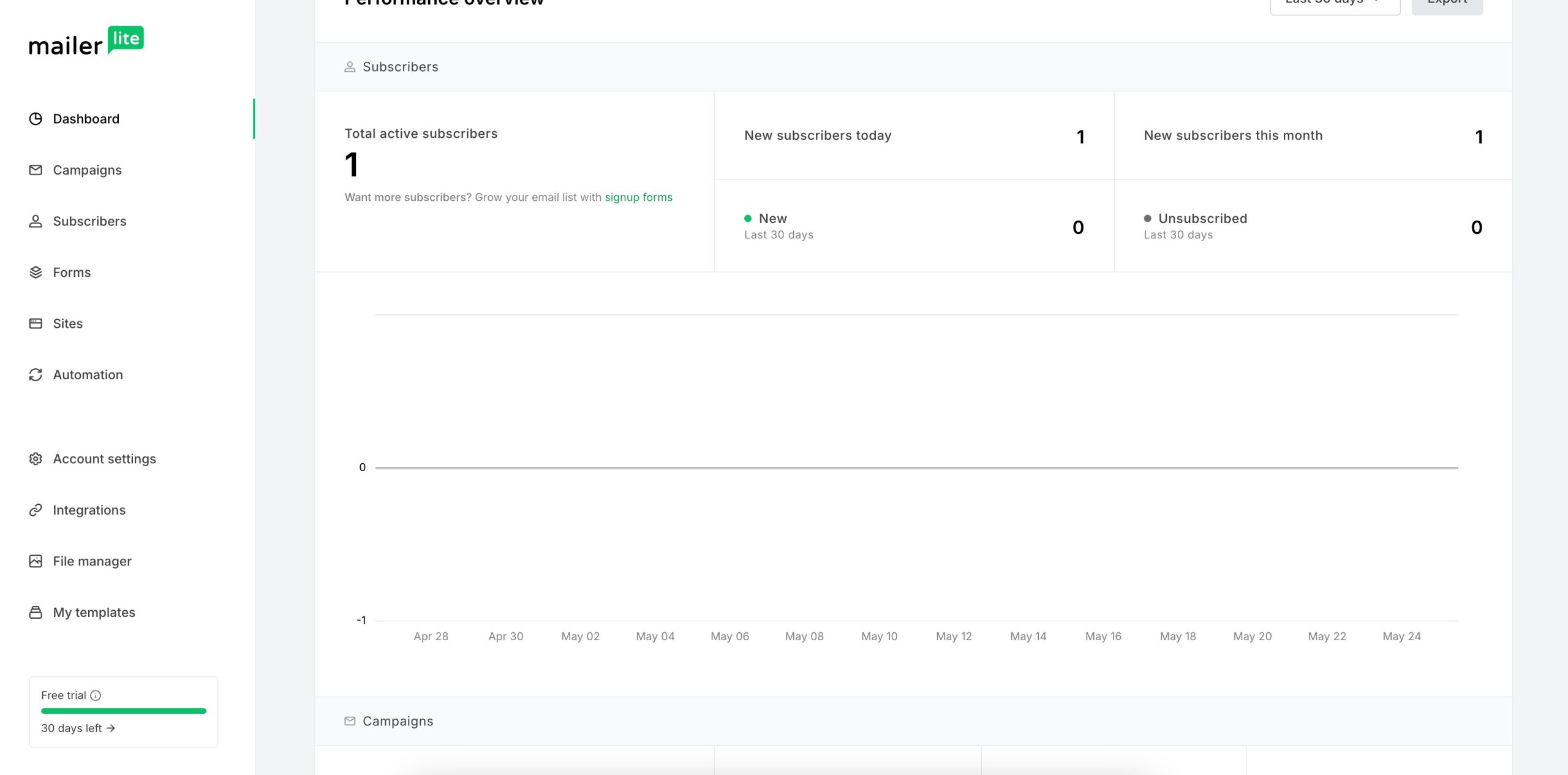
MailerLite’s pricing starts with a free plan for up to 1,000 subscribers, making it an accessible option for bloggers just starting with email marketing.
Key features of MailerLite:
- Drag-and-drop editor – Build emails easily without coding.
- Email automation – Send targeted emails based on user behavior.
- Landing pages & forms – Grow your list with custom designs.
16.2 Brevo (formerly Sendinblue)
Brevo, previously known as Sendinblue, is an all-in-one marketing platform that includes email marketing, SMS campaigns, and marketing automation.
Its email builder is intuitive and offers a wide range of customization options. Brevo’s pricing is based on the number of emails sent, with a free plan available for up to 300 emails per day.
Key features of Brevo:
- Multi-channel messaging via email, SMS, and WhatsApp.
- Marketing automation with behavior-based triggers.
- Built-in CRM for contact management and segmentation.
- Custom landing pages and lead capture forms.
16.3 FluentCRM
FluentCRM is a powerful WordPress plugin that combines email marketing, customer relationship management (CRM), and marketing automation features.
It offers a drag-and-drop email builder, automated campaigns, and integrations with popular WordPress plugins like WooCommerce and Elementor.
FluentCRM has a free version, but you’ll need to upgrade to the premium plan to unlock advanced features.
Key features of FluentCRM:
- Complete contact management inside WordPress.
- Drag-and-drop email automation builder.
- Advanced audience segmentation for targeted campaigns.
- Integrates with WooCommerce, Elementor, and more.
- Detailed reports to track email and automation performance.
17 Conclusion
The importance of having the right blogging tools cannot be overstated.
These blogging tools streamline your workflow, enhance the quality of your content, facilitate audience engagement, and contribute to your blog’s growth.
Investing in the essential blogging tools for writing, promoting, and analyzing your content allows you to work more efficiently, produce higher-quality posts, connect with your audience more effectively, and ultimately achieve success.
If you like this post, let us know by Tweeting @rankmathseo.
